publications
Below you can find a list of books I have (co-)authored or (co-)edited. There is also a list of peer-reviewed articles I have (co-)authored.
books
2023
-
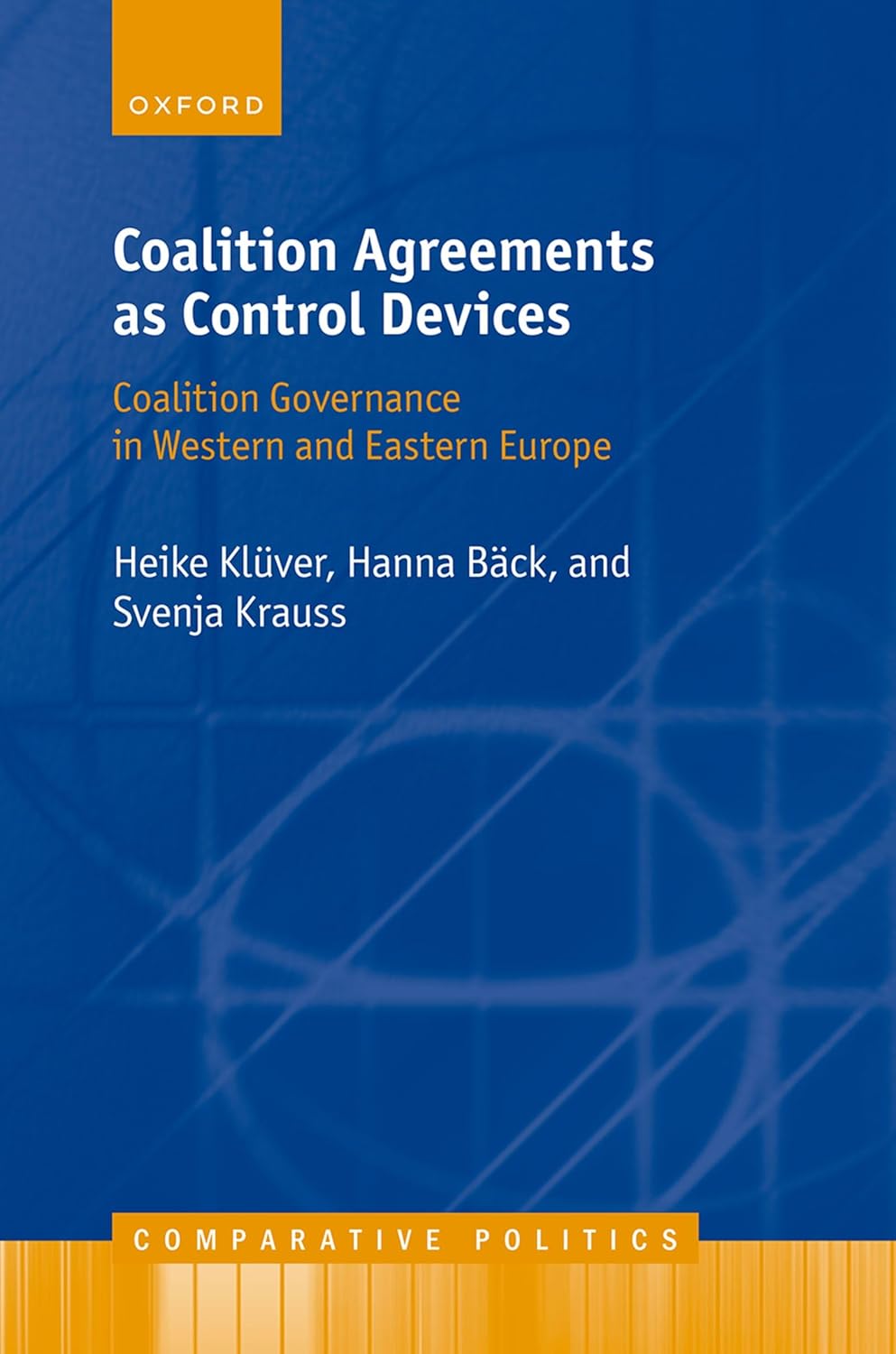 Coalition Agreements as Control Devices: Coalition Governance in Western and Eastern EuropeHeike Klüver, Hanna Bäck, and Svenja Krauss2023
Coalition Agreements as Control Devices: Coalition Governance in Western and Eastern EuropeHeike Klüver, Hanna Bäck, and Svenja Krauss2023Many coalition cabinets negotiate lengthy coalition contracts outlining the agenda for the time in office. Not only does negotiating these agreements take up time and resources, but compromises have to be made, which may result in cabinet conflicts and electoral costs. This book explores why political parties negotiate such agreements, and argues that coalition agreements are important control devices that allow coalition parties to keep their partners in line. The authors show that their use varies with the preference configuration in cabinet and the allocation of ministerial portfolios.
@book{kluver_coalition_2023, title = {Coalition {Agreements} as {Control} {Devices}: {Coalition} {Governance} in {Western} and {Eastern} {Europe}}, shorttitle = {Coalition {Agreements} as {Control} {Devices}}, author = {Klüver, Heike and Bäck, Hanna and Krauss, Svenja}, year = {2023}, publisher = {Oxford University Press}, address = {Oxford}, series = {Comparative politics}, isbn = {978-0-19-289991-0}, url = {https://academic.oup.com/book/45876}, language = {eng}, data = {https://dataverse.harvard.edu/dataset.xhtml?persistentId=doi:10.7910/DVN/XM5A08}, dataset = {coalitionagree}, }
2017
-
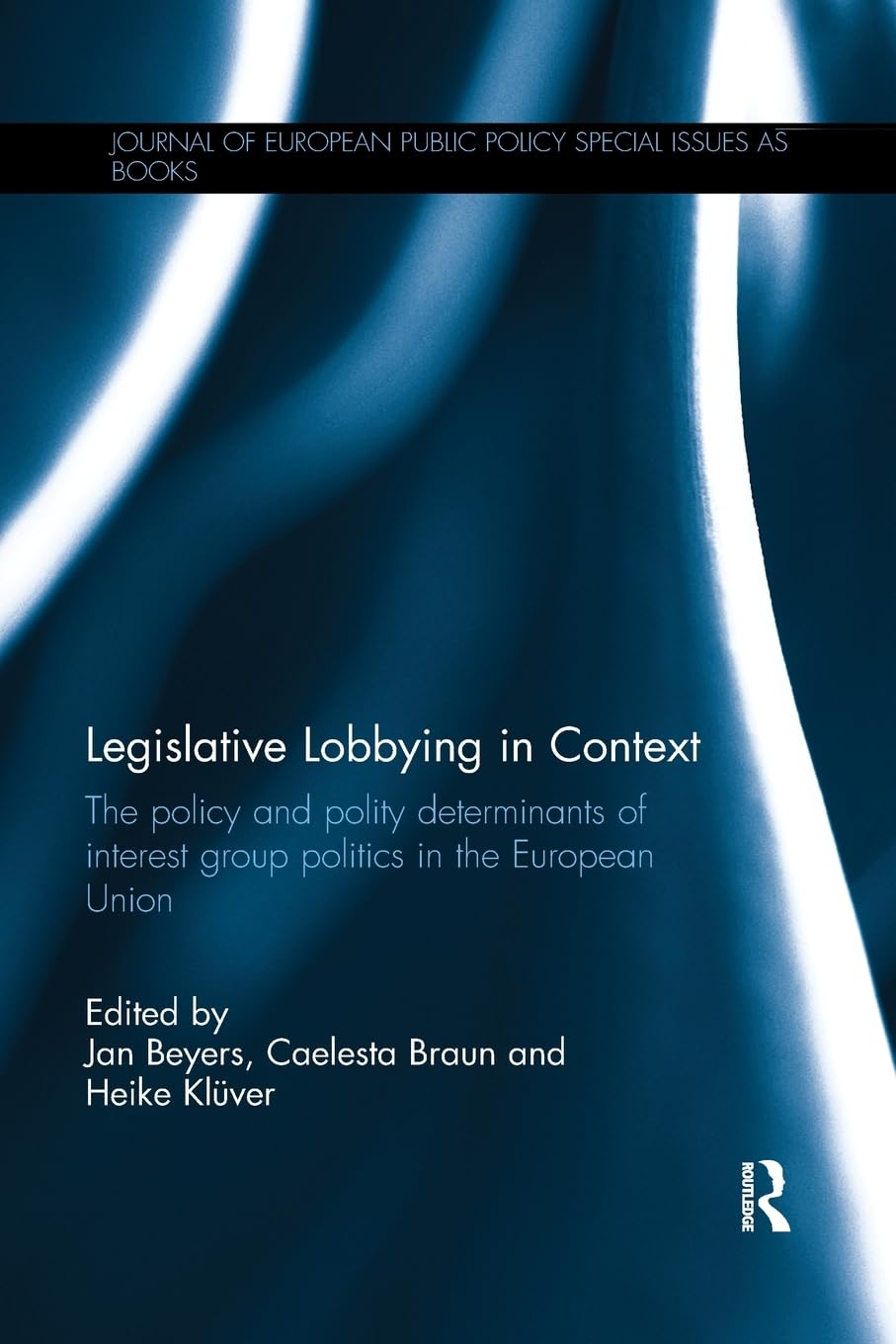 Legislative Lobbying in ContextJan Beyers, Caelesta Braun, and Heike Klüver2017
Legislative Lobbying in ContextJan Beyers, Caelesta Braun, and Heike Klüver2017The lack of previous research into political interest groups and taking into account policy-specific and institutional context characteristics is largely due to research designs that have been primarily focused on a small number of policy debates, with the result that contextual characteristics were largely held constant. This book brings together articles from different modules that are part of a larger European Collaborative Research Project, INTEREURO, carried out by research teams in nine different countries under the auspices of the European Science Foundation. The main goal of the book is to analyse strategies, framing and influence processes for a set of 125 legislative proposals submitted by the European Commission, in an effort to better understand the involvement of interest organizations in the decision-making process of the EU. Contributors draw on sophisticated and innovative policy-driven samples of interest group mobilization, allowing them to account systematically for how policy-specific and institutional context factors shape mobilization, lobbying strategies and influence of interest groups on public policy debates in the EU. In this way, the book makes an important contribution to the study of interest groups in the EU and represents the breadth of positions taken in the current literature.
@book{beyers_legislative_2017, title = {Legislative {Lobbying} in {Context}}, author = {Beyers, Jan and Braun, Caelesta and Klüver, Heike}, year = {2017}, publisher = {Taylor \& Francis Group}, isbn = {978-1-138-10376-4}, url = {https://www.routledge.com/Legislative-Lobbying-in-Context-The-Policy-and-Polity-Determinants-of-Interest-Group-Politics-in-the-European-Union/Beyers-Braun-Kluver/p/book/9781138103764}, }
2013
-
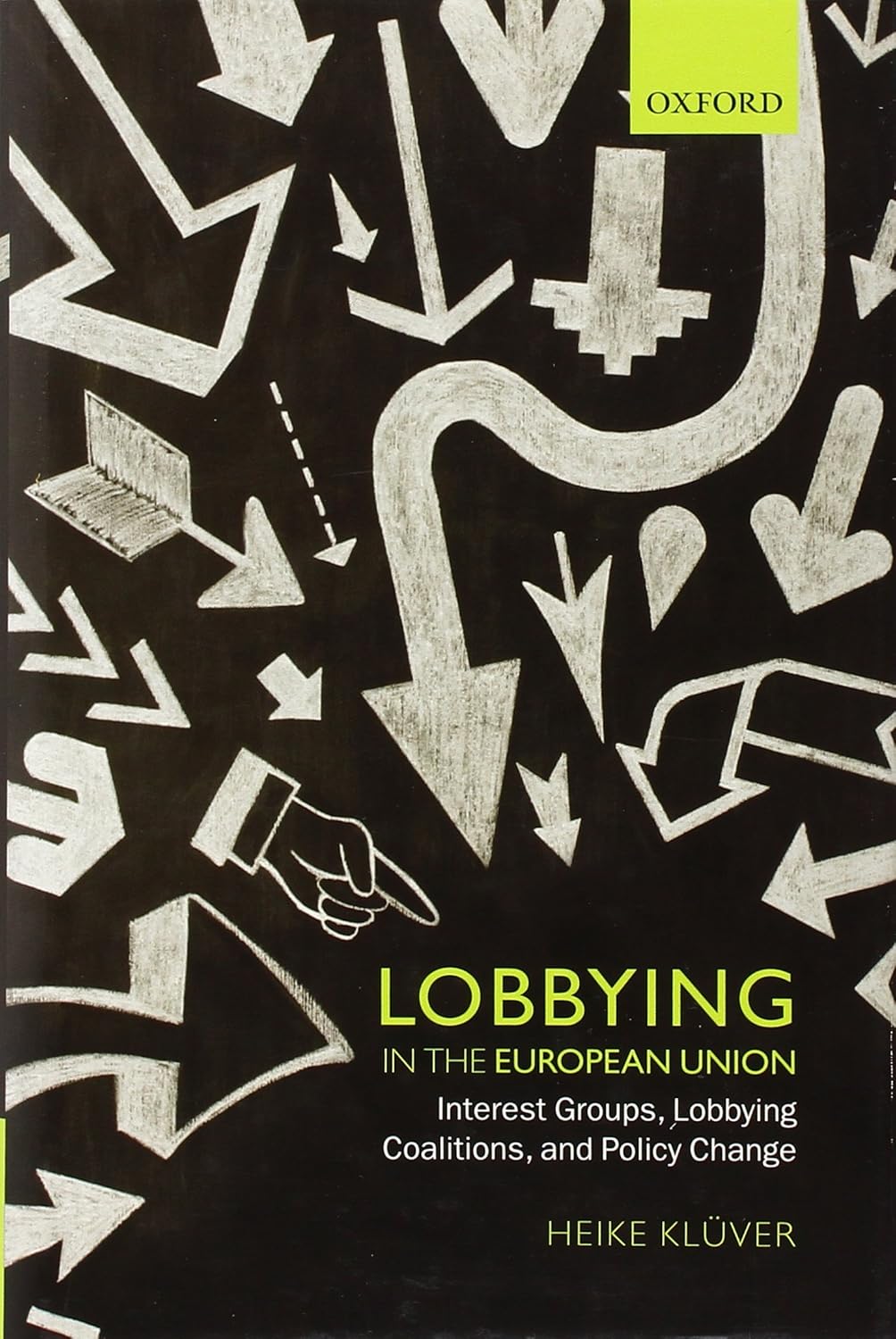 Lobbying in the European Union: Interest Groups, Lobbying Coalitions, and Policy ChangeHeike Klüver2013
Lobbying in the European Union: Interest Groups, Lobbying Coalitions, and Policy ChangeHeike Klüver2013Why can some interest groups influence policy-making while others cannot? Even though this question is central to the study of politics, we know little about the factors explaining interest group influence. Understanding lobbying success should be of particular concern to scholars of European politics since the European Union constitutes a promising political opportunity structure for organized interests. This book sheds light on the impact of interest groups on European policy-making and makes a major contribution to the study of both European Union politics and interest groups more generally. Klüver develops a comprehensive theoretical model for understanding lobbying success and presents an extensive empirical analysis of interest group influence on policy-making in the EU. The book relies on a large, new, and innovative dataset that combines a wide variety of data sources including a quantitative text analysis of European Commission consultations, an online survey of interest groups, information gathered on interest group websites, and legislative data retrieved from EU databases. This book analyzes interest group influence across 56 policy issues and 2,696 interest groups and shows that lobbying is an exchange relationship in which the European institutions trade influence for information, citizen support, and economic power. Importantly, this book demonstrates that it is not sufficient to solely focus on individual interest groups, but that it is crucial how interest groups come together in issue-specific lobbying coalitions. Lobbying is a collective enterprise in which information supply, citizen support, and economic power of entire lobbying coalitions are decisive for lobbying success.
@book{kluver_lobbying_2013, title = {Lobbying in the {European} {Union}: {Interest} {Groups}, {Lobbying} {Coalitions}, and {Policy} {Change}}, shorttitle = {Lobbying in the {European} {Union}}, author = {Klüver, Heike}, year = {2013}, publisher = {Oxford University Press}, address = {Oxford}, isbn = {978-0-19-163158-0}, url = {https://academic.oup.com/book/11574}, language = {eng}, }
book chapters
2025
-
 Understanding Pledge-Making in Coalition Agreements: Evidence from the COALITIONPOLICY DatasetFabio Ellger and Heike KlüverIn Handbook on Coalition Politics, 2025
Understanding Pledge-Making in Coalition Agreements: Evidence from the COALITIONPOLICY DatasetFabio Ellger and Heike KlüverIn Handbook on Coalition Politics, 2025@incollection{ellger_understanding_2025, title = {Understanding Pledge-Making in Coalition Agreements: {Evidence} from the {COALITIONPOLICY} Dataset}, author = {Ellger, Fabio and Klüver, Heike}, year = {2025}, address = {S.l.}, series = {Elgar {Handbooks} in {Political} {Science}}, isbn = {978-1-80392-955-2}, url = {https://www.elgaronline.com/edcollchap/book/9781803929569/chapter19.xml}, language = {en}, booktitle = {Handbook on {Coalition} {Politics}}, publisher = {Edward Elgar Publishing}, editor = {Bräuninger, Thomas and Debus, Marc}, pages = {332--352}, data = {https://dataverse.harvard.edu/dataset.xhtml?persistentId=doi:10.7910/DVN/DCZXXD}, }
articles
2026
-
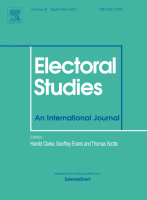 Buying Voter Support for Unpopular Policies: Evidence from German Nuclear Power PlantsAntónio Valentim, Heike Klüver, and Cornelius ErfortElectoral Studies, Forthcoming 2026
Buying Voter Support for Unpopular Policies: Evidence from German Nuclear Power PlantsAntónio Valentim, Heike Klüver, and Cornelius ErfortElectoral Studies, Forthcoming 2026How can governments ensure voters’ support for unpopular policies? Policymakers often have to implement policies that are unpopular in local communities, such as the construction of windmills or nuclear power plants. However, little is known about how policymakers can increase local support. We argue that perceived economic benefits increase support for otherwise unpopular policies. We test our argument by studying the consequences of nuclear power plants on support for the Green Party in Germany, a strong opponent of nuclear energy. We collected a novel dataset on the geographic location of nuclear plants and voting records since the 1980s. Using difference-in-differences and instrumental variable designs, we find that the opening of nuclear power plants has a negative effect on the vote share of the Greens. Additional individual-level panel analyses suggest that this effect is driven by economic considerations. Overall, these results are relevant for the study of energy transitions and the design of unpopular policies more generally.
@article{valentim_buying_2025, title = {Buying {Voter} {Support} for {Unpopular} {Policies}: {Evidence} from {German} {Nuclear} {Power} {Plants}}, shorttitle = {Buying {Voter} {Support} for {Unpopular} {Policies}}, author = {Valentim, António and Klüver, Heike and Erfort, Cornelius}, year = {2026}, month = {forthcoming}, journal = {Electoral Studies}, } -
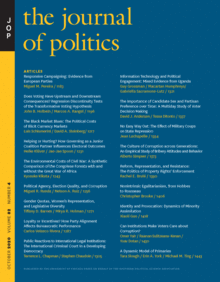 The Electoral Effects of State-Sponsored HomophobiaVioleta Ines Haas, Konstantin Bogatyrev, Tarik Abou-Chadi, Heike Klüver, and Lukas StoetzerThe Journal of Politics, Forthcoming 2026
The Electoral Effects of State-Sponsored HomophobiaVioleta Ines Haas, Konstantin Bogatyrev, Tarik Abou-Chadi, Heike Klüver, and Lukas StoetzerThe Journal of Politics, Forthcoming 2026Do strategies of state-sponsored homophobia translate into electoral gains? While a growing body of literature documents the increasing politicization of LGBTQ- and gender-related issues by illiberal elites, little is known about the electoral effects of these strategies. We address this important question by studying whether anti-LGBTQ mobilization pays off electorally for the initiating party. Empirically, we study the adoption of anti-LGBTQ resolutions in many Polish municipalities prior to the 2019 parliamentary election. Using a synthetic difference-in-differences design, we find that these resolutions significantly depressed turnout in affected municipalities, with opposition parties showing less mobilization capacity. By contrast, turnout for the incumbent Law and Justice Party increased substantially. Overall, this study’s findings are relevant for understanding the electoral consequences of both elite-led mobilization against stigmatized and discriminated groups, and policies of subnational democratic backsliding.
@article{haas_electoral_2025, title = {The {Electoral} {Effects} of {State}-{Sponsored} {Homophobia}}, author = {Haas, Violeta Ines and Bogatyrev, Konstantin and Abou-Chadi, Tarik and Klüver, Heike and Stoetzer, Lukas}, year = {2026}, month = {forthcoming}, journal = {The Journal of Politics}, language = {en}, } -
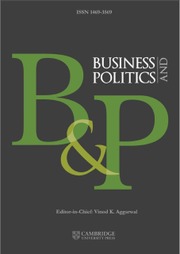 Can Interest Groups Shape Public Opinion? Experimental Evidence from Germany and the UKFelix Hartmann, Jan Stuckatz, Heike Klüver, and Kai-Uwe SchnappBusiness and Politics, Jan 2026
Can Interest Groups Shape Public Opinion? Experimental Evidence from Germany and the UKFelix Hartmann, Jan Stuckatz, Heike Klüver, and Kai-Uwe SchnappBusiness and Politics, Jan 2026Interest groups spend large amounts of money on public campaigns, but do these outside lobbying strategies change public opinion? Several recent studies investigate this question, but come to different conclusions. We integrate existing approaches into one factorial design and conduct a well-powered survey experiment across two countries. We randomize type of interest group support and message medium in support of two prominent climate policies. Our results suggest that interest group messages can have a short-term influence on public opinion. However, the effects are not different from policy messages without interest groups, are not larger for messages from interest group coalitions, and are only effective for subsidies, but not for increases in taxation. In addition, we investigate the mechanism linking outside lobbying and public opinion and find that outside lobbying signals higher support for policies among the public. Our results have implications for comparative studies of interest group strategies.
@article{hartmann_can_2026, title = {Can {Interest} {Groups} {Shape} {Public} {Opinion}? {Experimental} {Evidence} from {Germany} and the {UK}}, copyright = {https://creativecommons.org/licenses/by/4.0/}, author = {Hartmann, Felix and Stuckatz, Jan and Klüver, Heike and Schnapp, Kai-Uwe}, year = {2026}, month = jan, journal = {Business and Politics}, doi = {10.1017/bap.2025.10018}, issn = {1469-3569}, url = {https://www.cambridge.org/core/product/identifier/S1469356925100189/type/journal_article}, urldate = {2026-01-29}, language = {en}, }
2025
-
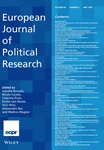 Perceived Inequality and PopulismLukas Stoetzer, Johannes Giesecke, and Heike KlüverEuropean Journal of Political Research, Oct 2025
Perceived Inequality and PopulismLukas Stoetzer, Johannes Giesecke, and Heike KlüverEuropean Journal of Political Research, Oct 2025Rising inequalities have been described as fertile ground for populist parties across the world. In this article, we investigate the role that inequality perception plays in strengthening populist attitudes and increasing support for populist parties. Using data from the International Social Survey Programme, we find that those who perceive greater inequality in society are more likely to support populist parties. To explore the causal relationship, we also conduct a survey experiment in Denmark, Germany, and Italy, randomly exposing participants to factual information about the wealth distribution. The results show that the perception of inequality can increase populist attitudes, but does not immediately affect the likelihood of voting for populist parties in this context. The findings speak to current debates on how inequalities and their perception became a pre-condition for the rise of populist parties all over Europe.
@article{stoetzer_perceived_2025, title = {Perceived {Inequality} and {Populism}}, author = {Stoetzer, Lukas and Giesecke, Johannes and Klüver, Heike}, year = {2025}, month = oct, journal = {European Journal of Political Research}, pages = {1--21}, doi = {10.1017/S1475676525100078}, url = {https://www.cambridge.org/core/product/identifier/S1475676525100078/type/journal_article}, urldate = {2025-10-07}, language = {en}, } -
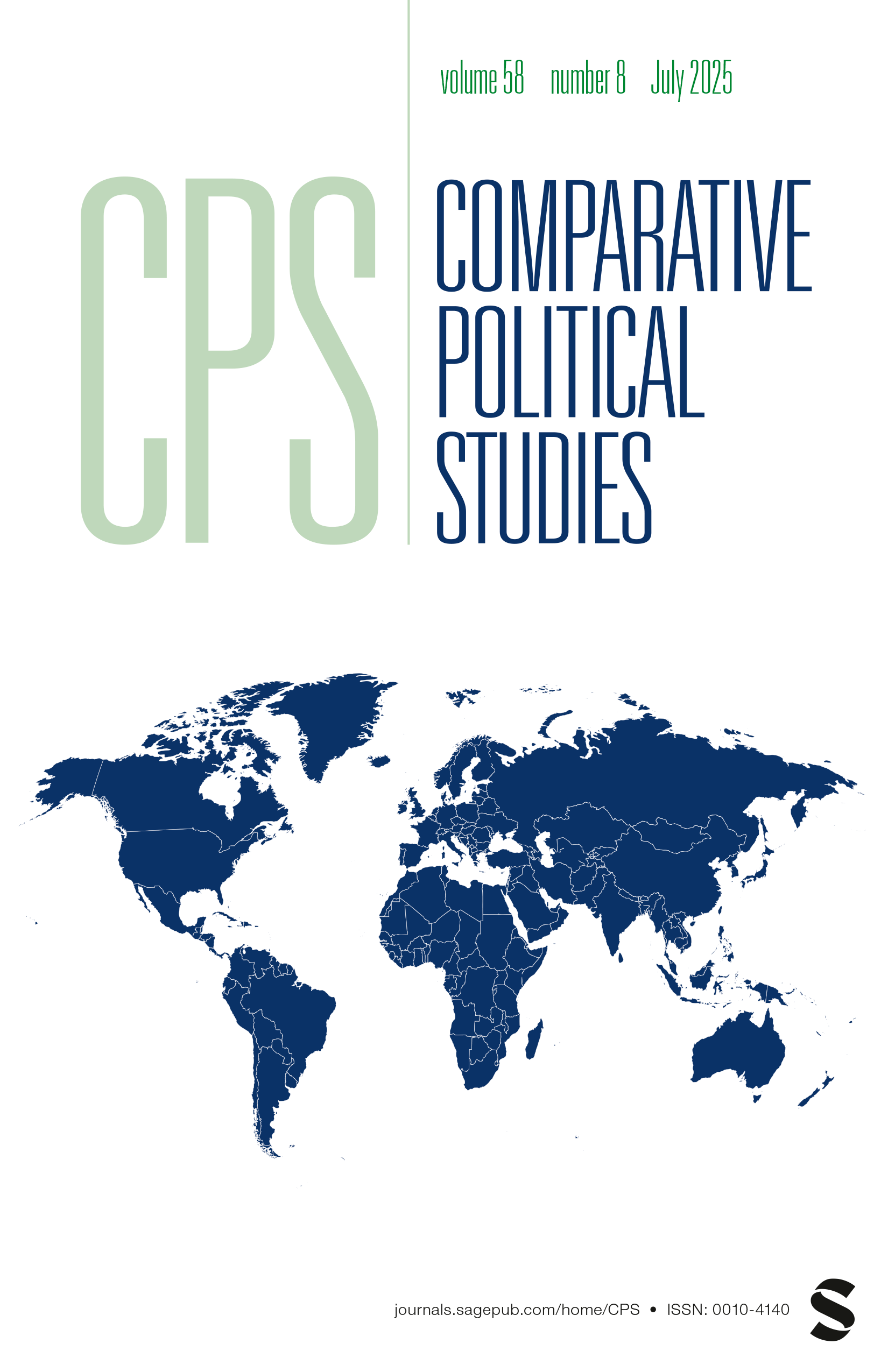 Hitting the Sweet Spot? The Electoral Consequences of Supporting Minority GovernmentsMaria Thürk and Heike KlüverComparative Political Studies, Jul 2025
Hitting the Sweet Spot? The Electoral Consequences of Supporting Minority GovernmentsMaria Thürk and Heike KlüverComparative Political Studies, Jul 2025Does supporting a minority cabinet harm a party’s electoral prospects? While minority governments have become more common in recent years, the electoral implications for parties supporting such cabinets remain unclear. Previous research suggests that support parties enjoy a favorable position, exerting policy influence while avoiding electoral losses associated with joining the government. However, we argue that this is only true for support parties without written agreements, as their support is less visible to voters. To test our argument, we compiled a novel dataset on the electoral performance of 563 parties in 304 elections across 31 countries since 1980. We estimate the effect of being a support party on subsequent electoral performance. Our findings indicate that parties which declare support perform better electorally than junior partners, while contract support parties do not. These insights shed light on the relationship between minority governments and electoral competition amidst growing party system fragmentation.
@article{thurk_hitting_2025, title = {Hitting the {Sweet} {Spot}? {The} {Electoral} {Consequences} of {Supporting} {Minority} {Governments}}, shorttitle = {Hitting the {Sweet} {Spot}?}, author = {Thürk, Maria and Klüver, Heike}, year = {2025}, month = jul, journal = {Comparative Political Studies}, volume = {58}, number = {8}, pages = {1670--1698}, doi = {10.1177/00104140241271210}, issn = {0010-4140, 1552-3829}, url = {https://journals.sagepub.com/doi/10.1177/00104140241271210}, urldate = {2025-06-06}, language = {en}, data = {https://dataverse.harvard.edu/dataset.xhtml?persistentId=doi:10.7910/DVN/SHKP32}, } -
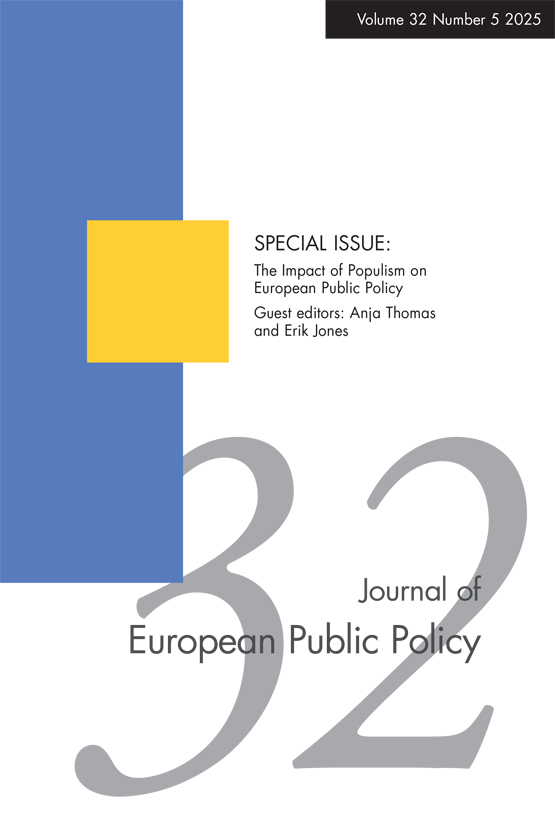 Mobilizing Europe’s Citizens to Take Action on Migration and Climate Change: Behavioral Evidence from 27 EU Member StatesHeiko Giebler, Johannes Giesecke, Macartan Humphreys, Swen Hutter, and Heike KlüverJournal of European Public Policy, Jun 2025
Mobilizing Europe’s Citizens to Take Action on Migration and Climate Change: Behavioral Evidence from 27 EU Member StatesHeiko Giebler, Johannes Giesecke, Macartan Humphreys, Swen Hutter, and Heike KlüverJournal of European Public Policy, Jun 2025This paper investigates how two politicized issues – migration and climate change – mobilize citizens across European countries. Building on the concept of issue-specific mobilization potentials, we examine citizens’ willingness to support petitions related to the two issues using an original behavioral measure embedded in the 2024 European Parliament Election Study. We document variation in political engagement and examine how opposing stances on issues owned by the left or the right mobilize citizens, how citizens’ agreement with issue positions affects support, and whether grievances, participation cultures, politicization levels, and the ideology of the national government can explain national-level variation. Our results indicate substantial variation in petition support across countries and issues, with the right-wing petition on migration attracting the most support. However, our country-level measures do not explain this variation well. Overall, our findings highlight the need for more nuanced, issue-specific approaches to understanding cross-national patterns of political participation.
@article{giebler_mobilizing_2025, title = {Mobilizing {Europe}’s Citizens to Take Action on Migration and Climate Change: Behavioral Evidence from 27 {EU} Member States}, shorttitle = {Mobilizing {Europe}’s citizens to take action on migration and climate change}, author = {Giebler, Heiko and Giesecke, Johannes and Humphreys, Macartan and Hutter, Swen and Klüver, Heike}, year = {2025}, month = jun, journal = {Journal of European Public Policy}, pages = {1--29}, doi = {10.1080/13501763.2025.2512032}, issn = {1350-1763, 1466-4429}, url = {https://www.tandfonline.com/doi/full/10.1080/13501763.2025.2512032}, urldate = {2025-06-06}, language = {en}, } -
 The Political Effects of Communicative Interventions During CrisesAsli Unan, Heike Klüver, Sara Hobolt, and Toni RodonEuropean Journal of Political Research, May 2025
The Political Effects of Communicative Interventions During CrisesAsli Unan, Heike Klüver, Sara Hobolt, and Toni RodonEuropean Journal of Political Research, May 2025Can communicative interventions by the government influence political trust and increase public compliance during crises? This study examines the impact of a televised speech by German Chancellor Angela Merkel at the onset of the COVID‐19 pandemic. Using an unexpected‐events‐during‐survey‐design, we find that the speech led to a 7‐percentage point increase in trust in the federal government and up to a 25‐percentage point decrease in citizens’ mobility. We also observe demographic variation in susceptibility to speech. We explore the underlying mechanisms by comparing Merkel’s speech with similar televised addresses by Mark Rutte and Boris Johnson, where we observe no comparable effects on attitudes. We suggest that specific content, such as an emphasis on solidarity and positive sentiment, may have played a role in mobilizing public support. Our findings indicate that effective leader communication can be a powerful tool for sustaining public support and ensuring compliance with crisis measures.
@article{unan_political_2025, title = {The {Political} {Effects} of {Communicative} {Interventions} {During} {Crises}}, author = {Unan, Asli and Klüver, Heike and Hobolt, Sara and Rodon, Toni}, year = {2025}, month = may, journal = {European Journal of Political Research}, pages = {1475--6765.70020}, doi = {10.1111/1475-6765.70020}, issn = {0304-4130, 1475-6765}, url = {https://ejpr.onlinelibrary.wiley.com/doi/10.1111/1475-6765.70020}, urldate = {2025-06-06}, language = {en}, data = {https://dataverse.harvard.edu/dataset.xhtml?persistentId=doi:10.7910/DVN/JFYMOK}, } -
 Closed Borders, Closed Minds? COVID‐Related Border Closures, EU Support and Hostility Towards ImmigrantsLisa Herbig, Asli Unan, Theresa Kuhn, Irene Rodríguez, Toni Rodon, and Heike KlüverEuropean Journal of Political Research, Apr 2025
Closed Borders, Closed Minds? COVID‐Related Border Closures, EU Support and Hostility Towards ImmigrantsLisa Herbig, Asli Unan, Theresa Kuhn, Irene Rodríguez, Toni Rodon, and Heike KlüverEuropean Journal of Political Research, Apr 2025Do border closures affect political attitudes? While a large body of research has discussed the effects of the COVID‐19 pandemic on nationalism and outgroup hostility, much less is known about how one of the main policy responses to stop the virus, closing the national borders, has impacted political attitudes. We argue that the sudden and unprecedented closures of national borders in the COVID‐19 crisis decreased EU support and increased hostility towards immigrants. These closures signalled that people from across the border are a threat to public health and showed little trust in European governance. We have collected fine‐grained regional data on COVID‐19‐related border closures in Germany that we matched with survey data from the German Socio‐Economic Panel. We rely on a difference‐in‐differences design to estimate the causal effect of closed borders on European identity and outgroup hostility. While we find that border closures decrease EU support and increase hostility towards immigrants, these effects fade away relatively quickly. Hence, our study suggests that border closures have only limited impact on political attitudes. Our findings have important implications for the growing literature on border politics in the EU and elsewhere.
@article{herbig_closed_2025, title = {Closed {Borders}, {Closed} {Minds}? {COVID}‐{Related} {Border} {Closures}, {EU} {Support} and {Hostility} {Towards} {Immigrants}}, shorttitle = {Closed {Borders}, {Closed} {Minds}?}, author = {Herbig, Lisa and Unan, Asli and Kuhn, Theresa and Rodríguez, Irene and Rodon, Toni and Klüver, Heike}, year = {2025}, month = apr, journal = {European Journal of Political Research}, volume = {64}, number = {7}, pages = {1923--1944}, doi = {10.1111/1475-6765.70025}, issn = {0304-4130, 1475-6765}, url = {https://ejpr.onlinelibrary.wiley.com/doi/10.1111/1475-6765.70025}, urldate = {2025-06-05}, language = {en}, data = {https://dataverse.harvard.edu/dataset.xhtml?persistentId=doi:10.7910/DVN/4NWUDL}, } -
 The Youth Gender Gap in Support for the Far RightÐorđe Milosav, Zachary Dickson, Sara B. Hobolt, Heike Klüver, Theresa Kuhn, and Toni RodonJournal of European Public Policy, Mar 2025
The Youth Gender Gap in Support for the Far RightÐorđe Milosav, Zachary Dickson, Sara B. Hobolt, Heike Klüver, Theresa Kuhn, and Toni RodonJournal of European Public Policy, Mar 2025The 2024 European Parliament election showcased a surprising new trend. While progressive parties have traditionally done well among younger voters, it was far-right parties that enjoyed unprecedented electoral support among young voters in the 2024 EP elections. Analyzing data from the European Election Studies (EES) 2024, covering 27 countries and almost 25,000 voters, this paper shows that there is a sizable gender gap in voting for the far right. The electoral success of far-right parties among young voters is primarily driven by the support of young men, peaking at over 21% of all young men in 2024 compared to only about 14% among women of the same age cohort. Descriptive analyses from the EES shows that this gap can partially be explained by attitudinal differences, with young women holding more socially progressive views than young men. Age-Period-Cohort models based on EES data covering eight elections from 1989 to 2024 further reveal that this gender gap is greatest for Millennials and Generation Z. Since political attitudes and voting behaviour during the formative years may have a long-lasting effect on voting patterns and attitudes later in life, our findings have important implications for the future of European democracies.
@article{milosav_youth_2025, title = {The {Youth} {Gender} {Gap} in {Support} for the {Far} {Right}}, author = {Milosav, Ðorđe and Dickson, Zachary and Hobolt, Sara B. and Klüver, Heike and Kuhn, Theresa and Rodon, Toni}, year = {2025}, month = mar, journal = {Journal of European Public Policy}, pages = {1--25}, doi = {10.1080/13501763.2025.2481181}, issn = {1350-1763, 1466-4429}, url = {https://www.tandfonline.com/doi/full/10.1080/13501763.2025.2481181}, urldate = {2025-05-15}, language = {en}, } -
 Benchmarking Pandemic Response: How the UK’s COVID-19 Vaccine Rollout Impacted Diffuse and Specific Support for the EUIrene Rodríguez, Toni Rodon, Asli Unan, Lisa Herbig, Heike Klüver, and Theresa KuhnBritish Journal of Political Science, Mar 2025
Benchmarking Pandemic Response: How the UK’s COVID-19 Vaccine Rollout Impacted Diffuse and Specific Support for the EUIrene Rodríguez, Toni Rodon, Asli Unan, Lisa Herbig, Heike Klüver, and Theresa KuhnBritish Journal of Political Science, Mar 2025Does the EU’s performance compared to neighboring countries influence public support? Using a benchmarking approach, we argue that people compare their country’s performance within the EU to that of a non-EU country, shaping their attitudes. The COVID-19 vaccine rollout in 2020 provides an ideal test case, as governments launched vaccination programs at different speeds. The UK began weeks before EU countries, allowing us to examine its impact on EU support. Using an Unexpected Event during Surveys Design (UESD) with Eurobarometer data, we find that the UK’s early rollout significantly reduced specific policy support for the EU but did not consistently affect diffuse support. Our findings offer key insights into attitudes toward European integration and performance evaluations.
@article{rodriguez_benchmarking_2025, title = {Benchmarking {Pandemic} {Response}: {How} the {UK}’s {COVID}-19 {Vaccine} {Rollout} {Impacted} {Diffuse} and {Specific} {Support} for the {EU}}, shorttitle = {Benchmarking {Pandemic} {Response}}, author = {Rodríguez, Irene and Rodon, Toni and Unan, Asli and Herbig, Lisa and Klüver, Heike and Kuhn, Theresa}, year = {2025}, journal = {British Journal of Political Science}, volume = {55}, pages = {e35}, doi = {10.1017/S0007123424000802}, issn = {0007-1234, 1469-2112}, url = {thttps://www.cambridge.org/core/product/identifier/S0007123424000802/type/journal_article}, urldate = {2025-05-15}, copyright = {https://creativecommons.org/licenses/by/4.0/}, language = {en}, data = {https://dataverse.harvard.edu/dataset.xhtml?persistentId=doi:10.7910/DVN/D6JI4M}, }
2024
-
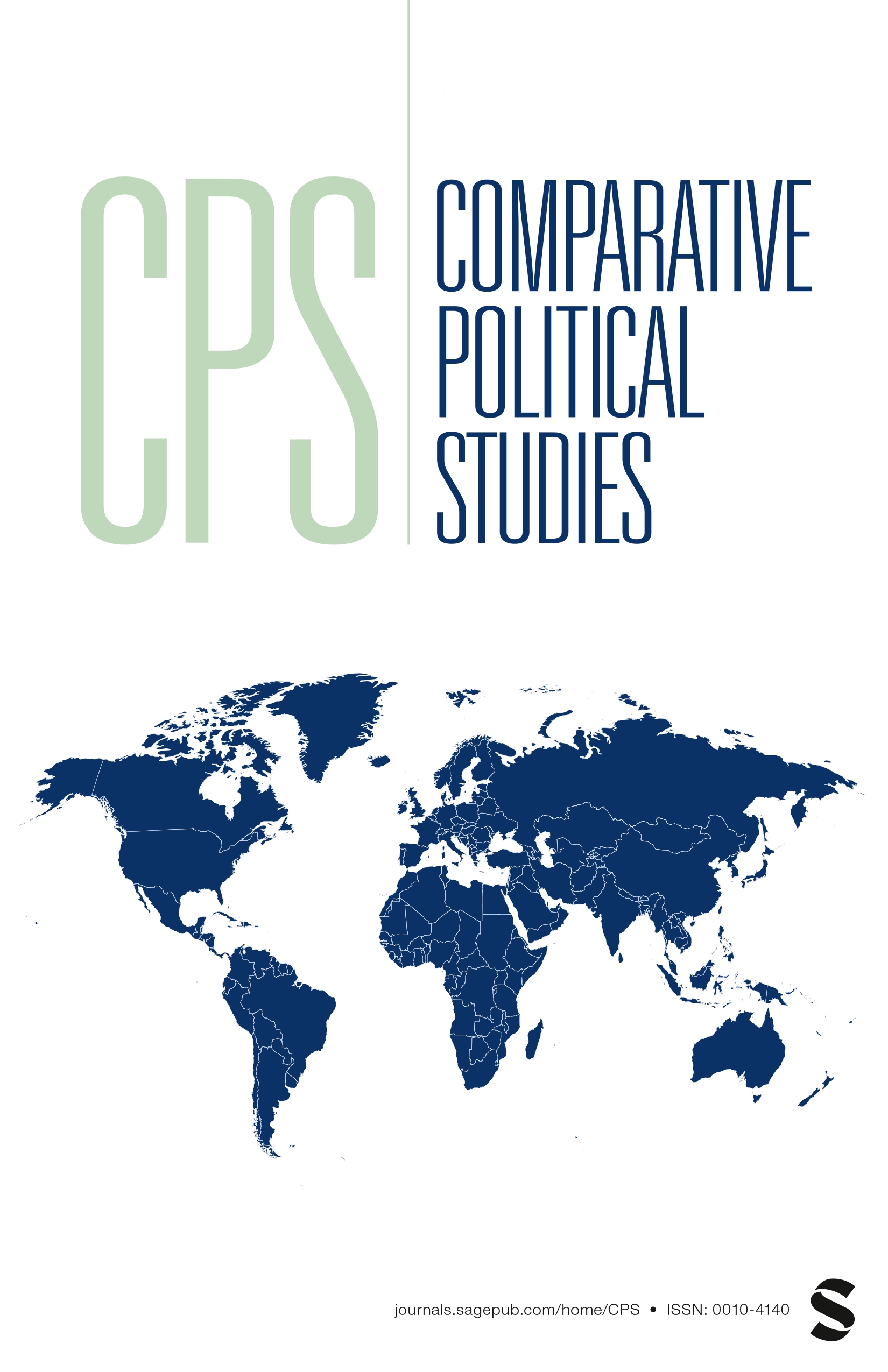 Social Influencers and Election OutcomesHeike KlüverComparative Political Studies, Dec 2024
Social Influencers and Election OutcomesHeike KlüverComparative Political Studies, Dec 2024Do social influencers affect election outcomes? Social influencers can reach millions of people through social media platforms such as Facebook, YouTube, TikTok and Instagram. However, research on social influencers is scarce and it is unclear whether they can affect elections. I argue that social influencers can influence elections through their role as digital opinion leaders and their power to shape the public agenda. Empirically, this study leverages an event that occurred during the 2019 European election campaign. Eight days before the 2019 EP election, the social influencer Rezo published a video in which he severely attacks the christian democratic CDU/CSU which was watched by over 11.5 million users until the election. Based on a differences-in-differences design, it is shown that the video had a sizeable effect on the election resulting in considerable vote losses for the CDU/CSU. The results are important for the debate on electoral competition and social media.
@article{kluver_social_2024, title = {Social {Influencers} and {Election} {Outcomes}}, author = {Klüver, Heike}, year = {2024}, month = dec, journal = {Comparative Political Studies}, pages = {00104140241306955}, doi = {10.1177/00104140241306955}, issn = {0010-4140, 1552-3829}, url = {https://journals.sagepub.com/doi/10.1177/00104140241306955}, urldate = {2025-05-09}, language = {en}, data = {https://dataverse.harvard.edu/dataset.xhtml?persistentId=doi:10.7910/DVN/0TRHTG}, } -
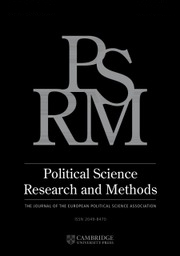 Europeans’ Attitudes Toward the EU Following Russia’s Invasion of UkraineAsli Unan and Heike KlüverPolitical Science Research and Methods, Dec 2024
Europeans’ Attitudes Toward the EU Following Russia’s Invasion of UkraineAsli Unan and Heike KlüverPolitical Science Research and Methods, Dec 2024The Russian invasion of Ukraine in February 2022 has had profound effects on the stability and security of Europe. This study examines the attitudes of Europeans toward the European Union (EU) in the aftermath of the invasion of Ukraine. Using Special Eurobarometer data collected between February and April 2022 with a representative sample of the EU (N = 26,502), it leverages the quasi-experimental setting with the coincidence between the timing of the invasion and the fieldwork period of the Eurobarometer. Our findings indicate a general increase in support for the EU in the aftermath of the invasion by 4 percentage-points (11 percent of a SD). While the amplitude of the effect remains similar, we see larger treatment effects as more days passed after the invasion. We also observe significant variation at the individual level in treatment effects, particularly by ideology, with left-leaning individuals being more critical of the EU following the invasion. In general, our research demonstrates the significant impact of regional conflicts on public attitudes toward supranational organizations such as the EU and highlights the role of the EU as a provider of security and stability in the face of such conflicts.
@article{unan_europeans_2024, title = {Europeans’ {Attitudes} {Toward} the {EU} {Following} {Russia}'s {Invasion} of {Ukraine}}, author = {Unan, Asli and Klüver, Heike}, year = {2024}, month = dec, journal = {Political Science Research and Methods}, pages = {1--6}, doi = {10.1017/psrm.2024.62}, issn = {2049-8470, 2049-8489}, url = {https://www.cambridge.org/core/product/identifier/S2049847024000621/type/journal_article}, urldate = {2025-05-15}, copyright = {http://creativecommons.org/licenses/by/4.0/}, language = {en}, data = {https://dataverse.harvard.edu/dataset.xhtml?persistentId=doi:10.7910/DVN/WRLXWI}, } -
 Extreme Weather Events Do Not Increase Political Parties’ Environmental AttentionTim Wappenhans, António Valentim, Heike Klüver, and Lukas F. StoetzerNature Climate Change, Jul 2024
Extreme Weather Events Do Not Increase Political Parties’ Environmental AttentionTim Wappenhans, António Valentim, Heike Klüver, and Lukas F. StoetzerNature Climate Change, Jul 2024Exposure to extreme weather events can make people more aware of environmental changes; however, it remains unclear how such events influence politicians’ behaviour. Combining supervised learning algorithms on over 260,000 press releases by European parties with a difference-in-differences design, we find that apart from Green parties, extreme weather events do not increase attention towards environmental issues. This suggests the consequences of climate change might not directly increase political attention.
@article{wappenhans_extreme_2024, title = {Extreme {Weather} {Events} {Do} {Not} {Increase} {Political} {Parties}' {Environmental} {Attention}}, author = {Wappenhans, Tim and Valentim, António and Klüver, Heike and Stoetzer, Lukas F.}, year = {2024}, month = jul, journal = {Nature Climate Change}, volume = {14}, number = {7}, pages = {696--699}, doi = {10.1038/s41558-024-02024-z}, issn = {1758-678X, 1758-6798}, url = {https://www.nature.com/articles/s41558-024-02024-z}, urldate = {2025-05-15}, language = {en}, data = {https://dataverse.harvard.edu/dataset.xhtml?persistentId=doi:10.7910/DVN/E9ASJI}, dataset = {partypress}, } -
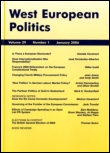 Adopting Restriction: How Coalition Governments Respond to Radical Right PartiesFabio Ellger and Heike KlüverWest European Politics, May 2024
Adopting Restriction: How Coalition Governments Respond to Radical Right PartiesFabio Ellger and Heike KlüverWest European Politics, May 2024Radical right parties (RRPs) have gained representation in parliaments across Europe, but little is known about their impact on government policy. Even though RRPs tend to end up in opposition, they have considerable influence on policy making within coalition governments. One expectation is that coalition governments are tough on immigration to optimise voter support when being exposed to right-wing parties in parliament. Coalition negotiations temporarily reduce accountability and allow cabinets to adjust policy positions without bearing the costs associated with opportunistic behaviour. This argument is tested using novel data on pre-electoral policy positions and post-electoral immigration policies for coalition cabinets in 24 European democracies from 1980 to 2015. The findings reveal that governments shift to more restrictive immigration policies in face of RRPs. This article expands on prior research on the influence of the radical right by demonstrating its direct influence on coalition governments’ joint immigration policy plans.
@article{ellger_adopting_2024, title = {Adopting Restriction: How Coalition Governments Respond to Radical Right Parties}, author = {Ellger, Fabio and Klüver, Heike}, year = {2024}, month = may, journal = {West European Politics}, pages = {1--33}, doi = {10.1080/01402382.2024.2341352}, url = {https://www.tandfonline.com/doi/abs/10.1080/01402382.2024.2341352}, language = {en}, data = {https://dataverse.harvard.edu/dataset.xhtml?persistentId=doi:10.7910/DVN/SW0WEG}, dataset = {coalitionagree}, } -
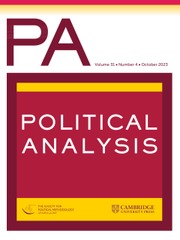 Trading Liberties: Estimating COVID-19 Policy Preferences from Conjoint DataFelix Hartmann, Macartan Humphreys, Ferdinand Geissler, Heike Klüver, and Johannes GieseckePolitical Analysis, Apr 2024
Trading Liberties: Estimating COVID-19 Policy Preferences from Conjoint DataFelix Hartmann, Macartan Humphreys, Ferdinand Geissler, Heike Klüver, and Johannes GieseckePolitical Analysis, Apr 2024Survey experiments are an important tool to measure policy preferences. Researchers often rely on the random assignment of policy attribute levels to estimate different types of average marginal effects. Yet, researchers are often interested in how respondents trade-off different policy dimensions. We use a conjoint experiment administered to more than 10,000 respondents in Germany, to study preferences over personal freedoms and public welfare during the COVID-19 crisis. Using a pre-registered structural model, we estimate policy ideal points and indifference curves to assess the conditions under which citizens are willing to sacrifice freedoms in the interest of public well-being. We document broad willingness to accept restrictions on rights alongside sharp heterogeneity with respect to vaccination status. The majority of citizens are vaccinated and strongly support limitations on freedoms in response to extreme conditions—especially, when they vaccinated themselves are exempted from these limitations. The unvaccinated minority prefers no restrictions on freedoms regardless of the severity of the pandemic. These policy packages also matter for reported trust in government, in opposite ways for vaccinated and unvaccinated citizens.
@article{hartmann_trading_2024, title = {Trading {Liberties}: {Estimating} {COVID}-19 {Policy} {Preferences} from {Conjoint} {Data}}, shorttitle = {Trading {Liberties}}, author = {Hartmann, Felix and Humphreys, Macartan and Geissler, Ferdinand and Klüver, Heike and Giesecke, Johannes}, year = {2024}, month = apr, journal = {Political Analysis}, volume = {32}, number = {2}, pages = {294--294}, doi = {10.1017/pan.2023.29}, issn = {1047-1987, 1476-4989}, url = {https://www.cambridge.org/core/product/identifier/S1047198723000293/type/journal_article}, urldate = {2025-05-09}, copyright = {https://creativecommons.org/licenses/by/4.0}, language = {en}, data = {https://dataverse.harvard.edu/dataset.xhtml?persistentId=doi:10.7910/DVN/SVD9SV}, }
2023
-
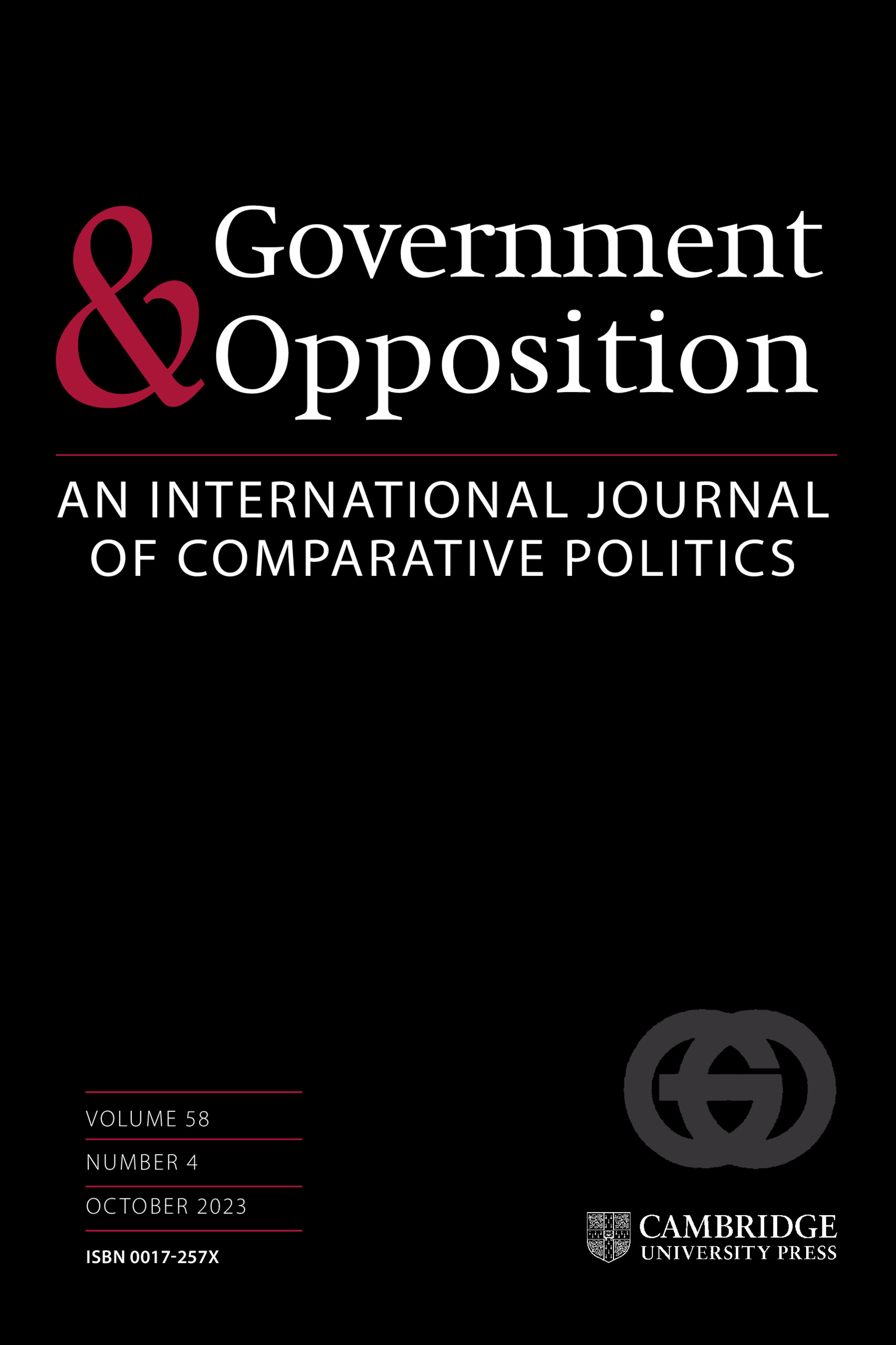 Cabinet Formation and Coalition Governance: The Effect of Portfolio Allocation on Coalition AgreementsSvenja Krauss and Heike KlüverGovernment and Opposition, Oct 2023
Cabinet Formation and Coalition Governance: The Effect of Portfolio Allocation on Coalition AgreementsSvenja Krauss and Heike KlüverGovernment and Opposition, Oct 2023While coalition agreements are significant in structuring government behaviour, their comprehensiveness varies considerably across cabinets. We argue that the average correspondence between parties’ priorities and portfolio allocation is important in explaining the comprehensiveness of coalition agreements because coalition parties that have obtained their preferred portfolios have less incentive to negotiate a detailed coalition agreement. We test our argument by combining newly collected data on coalition agreements drafted by 218 cabinets in 24 Western and Eastern European countries from 1945 to 2014 with data on the distribution of ministerial portfolios. We find that the shorter and less comprehensive the agreements, the higher the correspondence between parties’ priorities and portfolio allocation. Our results have important implications for our understanding of coalition governments and the relationship between government formation and cabinet governance.
@article{krauss_cabinet_2023, title = {Cabinet {Formation} and {Coalition} {Governance}: {The} {Effect} of {Portfolio} {Allocation} on {Coalition} {Agreements}}, shorttitle = {Cabinet {Formation} and {Coalition} {Governance}}, author = {Krauss, Svenja and Klüver, Heike}, year = {2023}, month = oct, journal = {Government and Opposition}, volume = {58}, number = {4}, pages = {862--881}, doi = {10.1017/gov.2021.68}, issn = {0017-257X, 1477-7053}, url = {https://www.cambridge.org/core/product/identifier/S0017257X21000683/type/journal_article}, urldate = {2025-05-30}, copyright = {https://creativecommons.org/licenses/by/4.0/}, language = {en}, } -
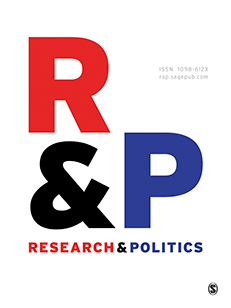 The Electoral Consequences of Policy-Making in Coalition GovernmentsFabio Ellger, Heike Klüver, and Anthea AlbertoResearch & Politics, Jul 2023
The Electoral Consequences of Policy-Making in Coalition GovernmentsFabio Ellger, Heike Klüver, and Anthea AlbertoResearch & Politics, Jul 2023Does policy-making in coalition governments affect cabinet parties’ electoral performance? Previous research shows that about two thirds of all propositions promised in coalition agreements are actually enacted. But does non-compliance with pledges made in the agreement affect subsequent electoral support? Drawing on the literature on performance voting, we expect that non-compliance is punished by voters, but the effect is conditioned by the importance of the issue and by a parties’ seniority status within the coalition. To test our argument, we have compiled the new comparative COALITIONPOLICY dataset on the enactment of more than 7000 policy pledges by 217 cabinet parties in 19 Western and Eastern European countries from 2000 to 2015. Across a broad range of models, we find no effect of pledge fulfillment on subsequent electoral performance. If anything, adherence to policy-promises only increases support for the prime minister party. These results have important implications for our understanding of political representation, coalition governance, and electoral competition in multiparty democracies.
@article{ellger_electoral_2023, title = {The {Electoral} {Consequences} of {Policy}-{Making} in {Coalition} {Governments}}, author = {Ellger, Fabio and Klüver, Heike and Alberto, Anthea}, year = {2023}, month = jul, journal = {Research \& Politics}, volume = {10}, number = {3}, doi = {10.1177/20531680231188266}, issn = {2053-1680, 2053-1680}, url = {https://journals.sagepub.com/doi/10.1177/20531680231188266}, urldate = {2025-05-09}, language = {en}, data = {https://dataverse.harvard.edu/dataset.xhtml?persistentId=doi:10.7910/DVN/DCZXXD}, } -
 The PARTYPRESS Database: A New Comparative Database of Parties’ Press ReleasesCornelius Erfort, Lukas F Stoetzer, and Heike KlüverResearch & Politics, Jul 2023
The PARTYPRESS Database: A New Comparative Database of Parties’ Press ReleasesCornelius Erfort, Lukas F Stoetzer, and Heike KlüverResearch & Politics, Jul 2023We present the PARTYPRESS Database, which compiles more than 250,000 published press releases from 68 parties in 9 European countries. The database covers the press releases of the most relevant political parties in these countries from 2010 onward. It provides a supervised machine learning classification of press releases into 21 unique issue categories according to a general codebook. The PARTYPRESS Database can be used to study parties’ issue agendas comparatively and over time. We extend a recent analysis in Gessler and Hunger (2022) to illustrate the usefulness of the database in studying dynamic party competition, communication, and behavior.
@article{erfort_partypress_2023, title = {The {PARTYPRESS} {Database}: {A} {New} {Comparative} {Database} of {Parties}’ {Press} {Releases}}, shorttitle = {The {PARTYPRESS} {Database}}, author = {Erfort, Cornelius and Stoetzer, Lukas F and Klüver, Heike}, year = {2023}, month = jul, journal = {Research \& Politics}, volume = {10}, number = {3}, doi = {10.1177/20531680231183512}, issn = {2053-1680, 2053-1680}, url = {https://journals.sagepub.com/doi/10.1177/20531680231183512}, urldate = {2025-05-09}, language = {en}, data = {https://dataverse.harvard.edu/dataset.xhtml?persistentId=doi:10.7910/DVN/OINX7Q}, dataset = {partypress}, } -
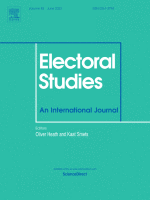 Can Wedge Strategies by Mainstream Parties Cross-Cut the Anti-Immigration Far Right Vote?Violeta I. Haas, Lukas F. Stoetzer, Petra Schleiter, and Heike KlüverElectoral Studies, Jun 2023
Can Wedge Strategies by Mainstream Parties Cross-Cut the Anti-Immigration Far Right Vote?Violeta I. Haas, Lukas F. Stoetzer, Petra Schleiter, and Heike KlüverElectoral Studies, Jun 2023Anti-immigration campaigns have helped far right parties to establish themselves in party systems around the world. We examine whether mainstream parties can employ wedge issue campaigns that divide the far right anti-immigration vote to win back electoral support. Wedge issues that cross-cut the anti-immigration vote may enhance the electoral support of mainstream parties, as long as they do not simultaneously alienate pro-immigration voters. We evaluate this expectation using a panel survey experiment conducted during the 2021 German federal election. The first wave allows us to identify wedge issues that the mainstream CDU/CSU can stress to cross-cut the anti-immigration vote. The second wave raises the salience of these issues by manipulating the perceived issue agenda of the CDU/CSU using hypothetical campaign posters. While our results show that wedge issue strategies are not effective on average, exploratory analyses reveal the potential of strategically targeted messaging in winning back support of some anti-immigration voters.
@article{haas_can_2023, title = {Can {Wedge} {Strategies} by {Mainstream} {Parties} {Cross}-{Cut} the {Anti}-{Immigration} {Far} {Right} {Vote}?}, author = {Haas, Violeta I. and Stoetzer, Lukas F. and Schleiter, Petra and Klüver, Heike}, year = {2023}, month = jun, journal = {Electoral Studies}, volume = {83}, pages = {102617}, doi = {10.1016/j.electstud.2023.102617}, issn = {02613794}, url = {https://linkinghub.elsevier.com/retrieve/pii/S0261379423000392}, urldate = {2025-06-05}, language = {en}, } -
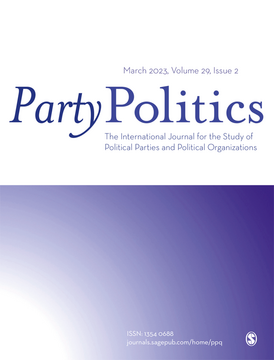 Introducing the Party-Interest Group Relationships in Contemporary Democracies DatasetsElin Haugsgjerd Allern, Vibeke Wøien Hansen, Lise Rødland, Maiken Røed, Heike Klüver, Cal Le Gall, David Marshall, Simon Otjes, Thomas Poguntke, Anne Rasmussen, Sabine Saurugger, and Christopher WitkoParty Politics, Mar 2023
Introducing the Party-Interest Group Relationships in Contemporary Democracies DatasetsElin Haugsgjerd Allern, Vibeke Wøien Hansen, Lise Rødland, Maiken Røed, Heike Klüver, Cal Le Gall, David Marshall, Simon Otjes, Thomas Poguntke, Anne Rasmussen, Sabine Saurugger, and Christopher WitkoParty Politics, Mar 2023Few existing datasets on parties and interest groups include data from both sides and a wide variety of interest groups and parties. We contribute to filling this gap by making several interconnected new datasets publicly available. The Party-Interest Group Relationships in Contemporary Democracies (PAIRDEM) datasets include cross-national data from three different surveys of (1) central party organizations, (2) legislative party groups, and (3) interest groups. A fourth dataset based on coding of party statutes and party finance data was established together with the Political Party Database. The datasets contain novel indicators on party-group relationships in up to 21 mature democracies. In this research note, we first present the main content of the datasets and the research design. Second, we present descriptive statistics documenting the extent of organizational ties between parties and groups in contemporary democracies. Third, we illustrate more advanced usage through a simple application.
@article{allern_introducing_2023, title = {Introducing the {Party}-{Interest} {Group} {Relationships} in {Contemporary} {Democracies} {Datasets}}, author = {Allern, Elin Haugsgjerd and Hansen, Vibeke Wøien and Rødland, Lise and Røed, Maiken and Klüver, Heike and Le Gall, Cal and Marshall, David and Otjes, Simon and Poguntke, Thomas and Rasmussen, Anne and Saurugger, Sabine and Witko, Christopher}, year = {2023}, month = mar, journal = {Party Politics}, volume = {29}, number = {2}, pages = {394--403}, doi = {10.1177/13540688221075591}, issn = {1354-0688, 1460-3683}, url = {https://journals.sagepub.com/doi/10.1177/13540688221075591}, urldate = {2025-05-09}, language = {en}, } -
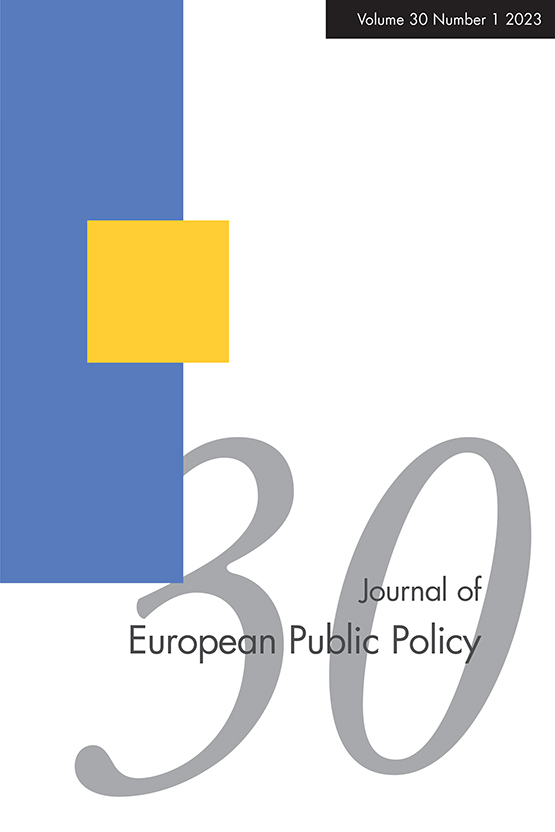 How Does Income Inequality Affect the Support for Populist Parties?Lukas F. Stoetzer, Johannes Giesecke, and Heike KlüverJournal of European Public Policy, Jan 2023
How Does Income Inequality Affect the Support for Populist Parties?Lukas F. Stoetzer, Johannes Giesecke, and Heike KlüverJournal of European Public Policy, Jan 2023Recent studies provide evidence that income inequality is a relevant driver for the electoral success of populist parties all over Europe. In this article, we aim to understand how exactly increasing income inequality can lead to support for populist parties. More specifically, we discuss four different attitudinal mechanisms from previous research: economic insecurities, trust in political elites, social integration, and national identity. We rely on eight waves of the European Social Survey and find that economic insecurities, trust in political elites, and national identity are linked to rising income inequality and populist support as expected. However, a causal mediation analysis shows that these mechanisms are not sufficient to fully understand the impact of income inequality on support for populists. This finding raises questions regarding the empirical support of existing theories to explain how macroeconomic changes in inequality became a pre-condition for the rise of populist parties.
@article{stoetzer_how_2023, title = {How {Does} {Income} {Inequality} {Affect} the {Support} for {Populist} {Parties}?}, author = {Stoetzer, Lukas F. and Giesecke, Johannes and Klüver, Heike}, year = {2023}, month = jan, journal = {Journal of European Public Policy}, volume = {30}, number = {1}, pages = {1--20}, doi = {10.1080/13501763.2021.1981981}, issn = {1350-1763, 1466-4429}, url = {https://www.tandfonline.com/doi/full/10.1080/13501763.2021.1981981}, urldate = {2025-05-15}, language = {en}, }
2022
-
 Public Support for Global Vaccine Sharing in the COVID-19 Pandemic: Evidence from GermanyFerdinand Geissler, Felix Hartmann, Macartan Humphreys, Heike Klüver, and Johannes GieseckePLOS ONE, Dec 2022
Public Support for Global Vaccine Sharing in the COVID-19 Pandemic: Evidence from GermanyFerdinand Geissler, Felix Hartmann, Macartan Humphreys, Heike Klüver, and Johannes GieseckePLOS ONE, Dec 2022By September 2021 an estimated 32% of the global population was fully vaccinated for COVID-19 but the global distribution of vaccines was extremely unequal, with 72% or more vaccinated in the ten countries with the highest vaccination rates and less than 2% in the ten countries with the lowest vaccination rates. Given that governments need to secure public support for investments in global vaccine sharing, it is important to understand the levels and drivers of public support for international vaccine solidarity. Using a factorial experiment administered to more than 10,000 online survey respondents in Germany in 2021, we demonstrate that the majority of German citizens are against global inequalities in vaccine distribution. Respondents are supportive of substantive funding amounts, on the order of the most generous contributions provided to date, though still below amounts that are likely needed for a successful global campaign. Public preferences appear largely to be driven by intrinsic concern for the welfare of global populations though are in part explained by material considerations—particularly risks of continued health threats from a failure to vaccinate globally. Strategic considerations are of more limited importance in shaping public opinion; in particular we see no evidence for free riding on contributions by other states. Finally, drawing on an additional survey experiment, we show that there is scope to use information campaigns highlighting international health externalities to augment public support for global campaigns.
@article{geissler_public_2022, title = {Public {Support} for {Global} {Vaccine} {Sharing} in the {COVID}-19 {Pandemic}: {Evidence} from {Germany}}, shorttitle = {Public {Support} for {Global} {Vaccine} {Sharing} in the {COVID}-19 {Pandemic}}, author = {Geissler, Ferdinand and Hartmann, Felix and Humphreys, Macartan and Klüver, Heike and Giesecke, Johannes}, year = {2022}, month = dec, journal = {PLOS ONE}, volume = {17}, number = {12}, pages = {e0278337}, doi = {10.1371/journal.pone.0278337}, issn = {1932-6203}, url = {https://dx.plos.org/10.1371/journal.pone.0278337}, urldate = {2025-05-09}, language = {en}, editor = {Rubinelli, Sara}, data = {https://wzb-ipi.github.io/vaccine_solidarity/}, } -
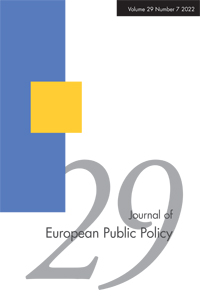 Policy Positions, Power and Interest Group-Party Lobby RoutinesElin Haugsgjerd Allern, Heike Klüver, David Marshall, Simon Otjes, Anne Rasmussen, and Christopher WitkoJournal of European Public Policy, Jul 2022
Policy Positions, Power and Interest Group-Party Lobby RoutinesElin Haugsgjerd Allern, Heike Klüver, David Marshall, Simon Otjes, Anne Rasmussen, and Christopher WitkoJournal of European Public Policy, Jul 2022Prior literature points to the importance of party power and ideology for interest group-party contacts in the legislative arena. But interest groups do not often have ideologies – they are typically active in a small number of policy domains and there may be different parties that share more similar preferences across different policy areas. Therefore, we examine whether and how party power and proximity in policy preferences predict the existence of party-interest group ‘lobby routines’ in specific policy domains, using a novel survey of representative samples of interest groups in seven long-established democracies. We find that groups often form routines with different parties in different policy areas and that preference proximity on relevant policy dimensions is positively associated with having such area-specific lobby routines. However, the results also suggest that powerful parties are more likely allies and that the effect of policy proximity on routines is positively conditioned by power.
@article{haugsgjerd_allern_policy_2022, title = {Policy {Positions}, {Power} and {Interest} {Group}-{Party} {Lobby} {Routines}}, author = {Haugsgjerd Allern, Elin and Klüver, Heike and Marshall, David and Otjes, Simon and Rasmussen, Anne and Witko, Christopher}, year = {2022}, month = jul, journal = {Journal of European Public Policy}, volume = {29}, number = {7}, pages = {1029--1048}, doi = {10.1080/13501763.2021.1912148}, issn = {1350-1763, 1466-4429}, url = {https://www.tandfonline.com/doi/full/10.1080/13501763.2021.1912148}, urldate = {2025-05-09}, language = {en}, }
2021
-
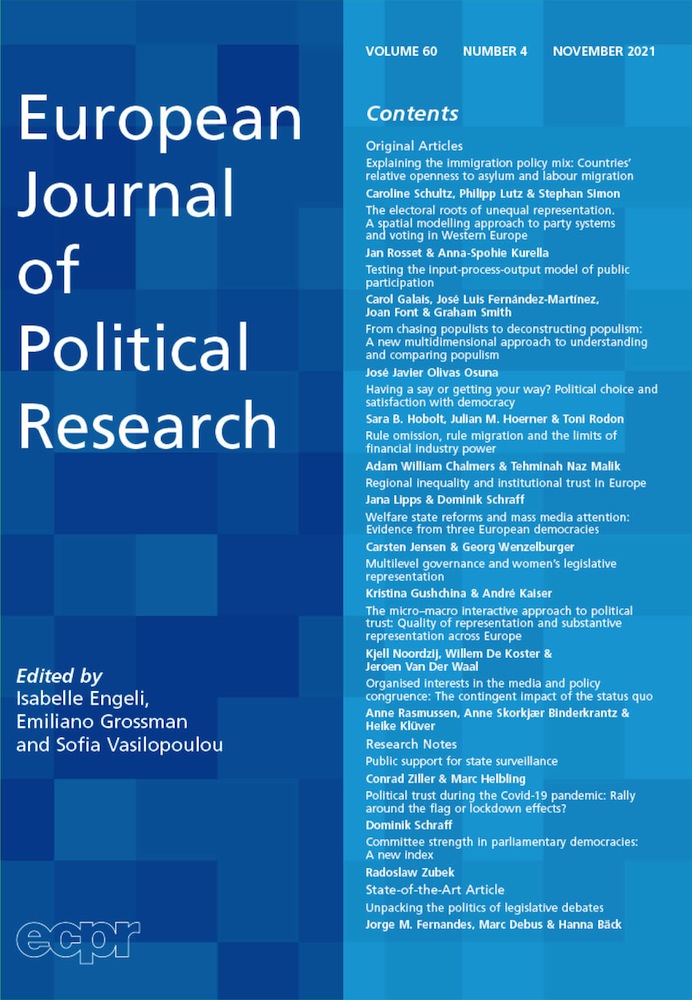 Organised Interests in the Media and Policy Congruence: The Contingent Impact of the Status QuoAnne Rasmussen, Anne Skorkjær Binderkrantz, and Heike KlüverEuropean Journal of Political Research, Nov 2021
Organised Interests in the Media and Policy Congruence: The Contingent Impact of the Status QuoAnne Rasmussen, Anne Skorkjær Binderkrantz, and Heike KlüverEuropean Journal of Political Research, Nov 2021While a multitude of studies have investigated the link between opinion and policy, we have little knowledge of how and when organised interests affect this linkage. We argue that the alignment of organised interests affects opinion–policy congruence by influencing the weight decision‐makers attach to citizen preferences. Moreover, we propose that alignment between majorities of groups and the public matters the most when status quo bias must be overcome for the public to obtain its preferred policy. We test our theoretical claims drawing on a comprehensive media content analysis of 160 policy issues in Germany and Denmark. Our results present a more sceptical picture of the ability of groups to suppress the opinion–policy linkage than the one frequently presented in the academic literature and public debate. We find that the capacity of groups to affect whether policy is congruent with the majority of the public is restricted to situations where the public supports a change in the status quo. In these cases, policy is less likely to end up reflecting public opinion if the majority of interest groups do not support the public position. In cases where the public is supportive of the policy status quo, the position of interest groups does not affect the likelihood that policy will eventually reflect the preferred position of the public. Our findings expand existing knowledge of organised interests in the study of policy representation and have important implications for understanding democratic governance.
@article{rasmussen_organised_2021, title = {Organised {Interests} in the {Media} and {Policy} {Congruence}: {The} {Contingent} {Impact} of the {Status} {Quo}}, shorttitle = {Organised {Interests} in the {Media} and {Policy} {Congruence}}, author = {Rasmussen, Anne and Binderkrantz, Anne Skorkjær and Klüver, Heike}, year = {2021}, month = nov, journal = {European Journal of Political Research}, volume = {60}, number = {4}, pages = {975--993}, doi = {10.1111/1475-6765.12434}, issn = {0304-4130, 1475-6765}, url = {https://ejpr.onlinelibrary.wiley.com/doi/10.1111/1475-6765.12434}, urldate = {2025-05-15}, language = {en}, data = {https://ejpr.onlinelibrary.wiley.com/doi/10.1111/1475-6765.12434}, } -
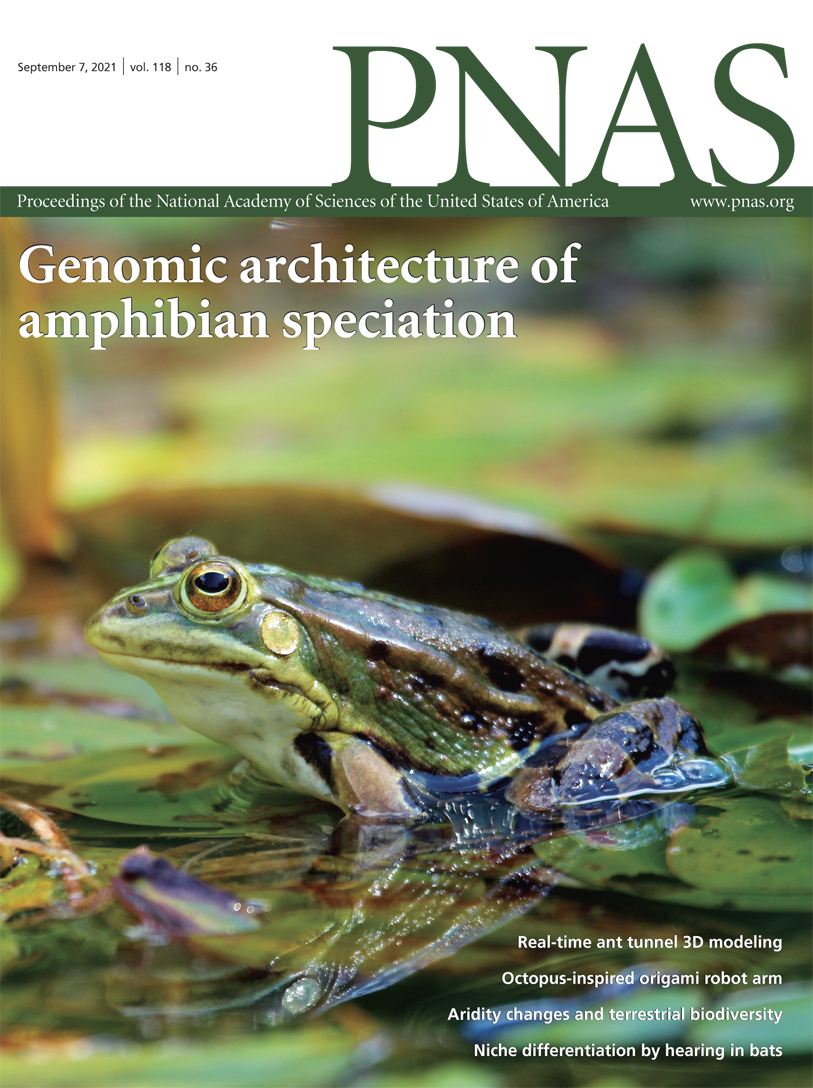 Incentives Can Spur COVID-19 Vaccination UptakeHeike Klüver, Felix Hartmann, Macartan Humphreys, Ferdinand Geissler, and Johannes GieseckeProceedings of the National Academy of Sciences, Aug 2021
Incentives Can Spur COVID-19 Vaccination UptakeHeike Klüver, Felix Hartmann, Macartan Humphreys, Ferdinand Geissler, and Johannes GieseckeProceedings of the National Academy of Sciences, Aug 2021Recent evidence suggests that vaccination hesitancy is too high in many countries to sustainably contain COVID-19. Using a factorial survey experiment administered to 20,500 online respondents in Germany, we assess the effectiveness of three strategies to increase vaccine uptake, namely, providing freedoms, financial remuneration, and vaccination at local doctors. Our results suggest that all three strategies can increase vaccination uptake on the order of two to three percentage points (PP) overall and five PP among the undecided. The combined effects could be as high as 13 PP for this group. The returns from different strategies vary across age groups, however, with older cohorts more responsive to local access and younger cohorts most responsive to enhanced freedoms for vaccinated citizens.
@article{kluver_incentives_2021, title = {Incentives {Can} {Spur} {COVID}-19 {Vaccination} {Uptake}}, author = {Klüver, Heike and Hartmann, Felix and Humphreys, Macartan and Geissler, Ferdinand and Giesecke, Johannes}, year = {2021}, month = aug, journal = {Proceedings of the National Academy of Sciences}, volume = {118}, number = {36}, doi = {10.1073/pnas.2109543118}, url = {https://www.pnas.org/doi/abs/10.1073/pnas.2109543118}, language = {en}, data = {https://wzb-ipi.github.io/covid_hesitancy_2021/}, }
2020
-
 The Survival of Interest Groups: Evidence from GermanyHeike KlüverWest European Politics, Nov 2020
The Survival of Interest Groups: Evidence from GermanyHeike KlüverWest European Politics, Nov 2020Interest groups are important intermediary organisations that function as a transmission belt between societal interests and political decision-makers. However, while some interest groups survive over decades, others only last a few years. This article argues that the survival of interest groups depends on their ability to mobilise resources which is crucially affected by interest group type and the public salience of an interest group’s policy domain. The theoretical expectations are tested based on a novel dataset mapping the survival of 1699 interest groups registered at the German Bundestag between 1974 and 2012. Using event history analysis, it is shown that interest group type and public salience indeed affect whether interest groups survive. Sectional groups last significantly longer than cause groups, and interest group survival increases with the public salience of their policy area. The results have major implications for our understanding of interest groups and political representation in contemporary democracies.
@article{kluver_survival_2020, title = {The {Survival} of {Interest} {Groups}: {Evidence} from {Germany}}, shorttitle = {The {Survival} of {Interest} {Groups}}, author = {Klüver, Heike}, year = {2020}, month = nov, journal = {West European Politics}, volume = {43}, number = {7}, pages = {1436--1454}, doi = {10.1080/01402382.2019.1662634}, issn = {0140-2382, 1743-9655}, url = {https://www.tandfonline.com/doi/full/10.1080/01402382.2019.1662634}, urldate = {2025-05-15}, language = {en}, data = {https://dataverse.harvard.edu/dataset.xhtml?persistentId=doi:10.7910/DVN/Q5GGCF}, dataset = {lobbylist}, } -
 Helping or Hurting? How Governing as a Junior Coalition Partner Influences Electoral OutcomesHeike Klüver and Jae-Jae SpoonThe Journal of Politics, Oct 2020
Helping or Hurting? How Governing as a Junior Coalition Partner Influences Electoral OutcomesHeike Klüver and Jae-Jae SpoonThe Journal of Politics, Oct 2020Does joining a governing coalition as a junior partner influence a party’s subsequent electoral success? We argue that joining a multiparty cabinet as a junior partner considerably hurts a party’s future electoral prospects as junior partners cannot enact much of what they promised before the election and since they cannot sufficiently differentiate themselves from their larger coalition partner. To test our theoretical expectations comparatively and over time, we have compiled a comprehensive data set on the electoral performance of 307 political parties running in 219 elections in twenty-eight European countries from 1972 to 2017. To shed light on the underlying causal mechanisms, we additionally provide empirical evidence from an illustrative case study showing that the inability to deliver on election promises and a large degree of misperception among voters are important drivers of junior coalition parties’ electoral losses. Our findings provide important insights into the relationship between coalition governments and electoral competition.
@article{kluver_helping_2020, title = {Helping or {Hurting}? {How} {Governing} as a {Junior} {Coalition} {Partner} {Influences} {Electoral} {Outcomes}}, shorttitle = {Helping or {Hurting}?}, author = {Klüver, Heike and Spoon, Jae-Jae}, year = {2020}, month = oct, journal = {The Journal of Politics}, volume = {82}, number = {4}, pages = {1231--1242}, doi = {10.1086/708239}, issn = {0022-3816, 1468-2508}, url = {https://www.journals.uchicago.edu/doi/10.1086/708239}, urldate = {2025-05-09}, language = {en}, data = {https://dataverse.harvard.edu/dataset.xhtml?persistentId=doi:10.7910/DVN/KVIJSY}, } -
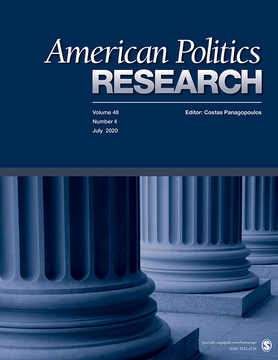 Electoral Vulnerability, Party Affiliation, and Dyadic Constituency Responsiveness in U.S. LegislaturesNathalie Giger, Heike Klüver, and Christopher WitkoAmerican Politics Research, Jul 2020
Electoral Vulnerability, Party Affiliation, and Dyadic Constituency Responsiveness in U.S. LegislaturesNathalie Giger, Heike Klüver, and Christopher WitkoAmerican Politics Research, Jul 2020It is often argued that electoral vulnerability is critical to constituency responsiveness. We investigate this possibility using different measures of vulnerability, but argue that in the United States the Republican Party may be less responsive than the Democratic Party due to its core constituency and view of representation. We test our hypotheses relying on an innovative research design that exploits referenda in U.S. states to compare legislator voting behavior with voter preferences on exactly the same policy proposal, allowing us to overcome the measurement problems of much previous research. Based on a newly compiled data set of more than 3,000 voting decisions for 818 legislators on 27 referenda, we find high levels of congruence, but that congruence with the median voter is higher for legislators who are running for reelection. We also find that Democrats are more responsive after a close election but that Republicans are not sensitive to electoral margins.
@article{giger_electoral_2020, title = {Electoral {Vulnerability}, {Party} {Affiliation}, and {Dyadic} {Constituency} {Responsiveness} in {U}.{S}. {Legislatures}}, author = {Giger, Nathalie and Klüver, Heike and Witko, Christopher}, year = {2020}, month = jul, journal = {American Politics Research}, volume = {48}, number = {4}, pages = {484--491}, doi = {10.1177/1532673X19891990}, issn = {1532-673X, 1552-3373}, url = {https://journals.sagepub.com/doi/10.1177/1532673X19891990}, urldate = {2025-05-09}, language = {en}, } -
 Setting the Party Agenda: Interest Groups, Voters and Issue AttentionHeike KlüverBritish Journal of Political Science, Jul 2020
Setting the Party Agenda: Interest Groups, Voters and Issue AttentionHeike KlüverBritish Journal of Political Science, Jul 2020Do political parties respond to interest group mobilization? While party responsiveness to voters has received widespread attention, little is known about how interest groups affect parties’ policy agendas. I argue that political parties respond to interest groups as lobbyists offer valuable information, campaign contributions, electoral support and personal rewards, but that party responsiveness is conditioned by voter preferences. Based on a novel longitudinal analysis studying the responsiveness of German parties to interest groups across eleven issue areas and seven elections from 1987 until 2009, it is shown that parties adjust their policy agendas in response to interest group mobilization and that interest groups are more successful in shaping party policy when their priorities coincide with those of the electorate.
@article{kluver_setting_2020, title = {Setting the {Party} {Agenda}: {Interest} {Groups}, {Voters} and {Issue} {Attention}}, shorttitle = {Setting the {Party} {Agenda}}, author = {Klüver, Heike}, year = {2020}, month = jul, journal = {British Journal of Political Science}, volume = {50}, number = {3}, pages = {979--1000}, doi = {10.1017/S0007123418000078}, issn = {0007-1234, 1469-2112}, url = {https://www.cambridge.org/core/product/identifier/S0007123418000078/type/journal_article}, urldate = {2025-05-15}, copyright = {https://www.cambridge.org/core/terms}, language = {en}, data = {https://dataverse.harvard.edu/dataset.xhtml?persistentId=doi:10.7910/DVN/VVDOUK}, dataset = {lobbylist}, } -
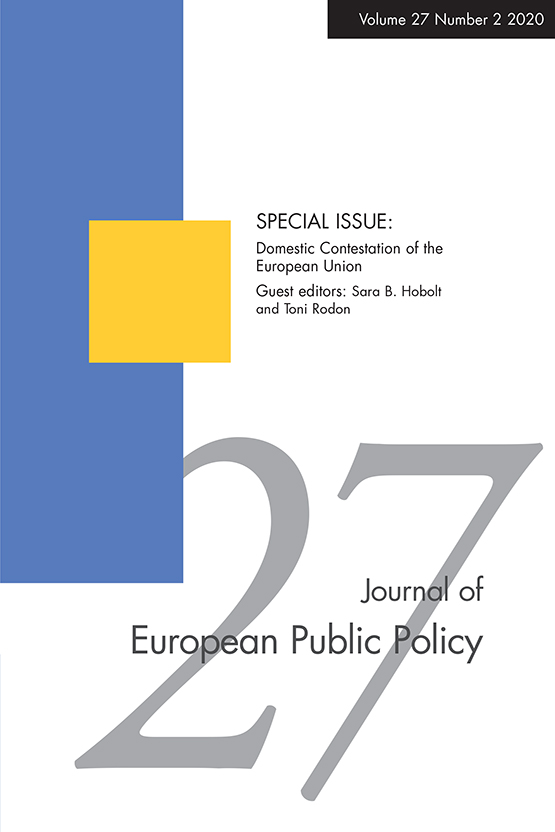 Responding to Far Right Challengers: Does Accommodation Pay Off?Jae-Jae Spoon and Heike KlüverJournal of European Public Policy, Feb 2020
Responding to Far Right Challengers: Does Accommodation Pay Off?Jae-Jae Spoon and Heike KlüverJournal of European Public Policy, Feb 2020Right-wing populist and far right parties are on the rise across Europe. While established parties are suffering dramatic electoral losses, right-wing parties are celebrating one electoral victory after another. To address their radical right challengers, many established parties have adopted a so-called ‘accommodative strategy’ by taking a more immigration-skeptical policy position. However, it is unclear whether such a strategy yields the expected benefits or whether such a position shift in turn hurts a party electorally. In this article, we find that mainstream left parties benefit from ‘going tough on immigration’ whereas it neither helps nor hurts mainstream right parties electorally. We arrive at this conclusion through an analysis of 16,811 vote choices in 15 elections in six countries from 1998 until 2013. Our findings have important implications for understanding what explains the rise of far right parties and the changing nature of electoral competition across Europe.
@article{spoon_responding_2020, title = {Responding to {Far} {Right} {Challengers}: {Does} {Accommodation} {Pay} {Off}?}, shorttitle = {Responding to {Far} {Right} {Challengers}}, author = {Spoon, Jae-Jae and Klüver, Heike}, year = {2020}, month = feb, journal = {Journal of European Public Policy}, volume = {27}, number = {2}, pages = {273--291}, doi = {10.1080/13501763.2019.1701530}, issn = {1350-1763, 1466-4429}, url = {https://www.tandfonline.com/doi/full/10.1080/13501763.2019.1701530}, urldate = {2025-05-15}, language = {en}, }
2019
-
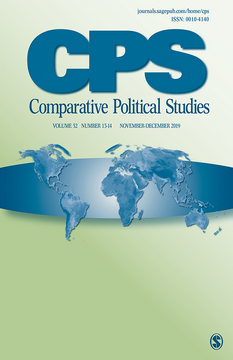 Coalition Agreements, Issue Attention, and Cabinet GovernanceHeike Klüver and Hanna BäckComparative Political Studies, Nov 2019
Coalition Agreements, Issue Attention, and Cabinet GovernanceHeike Klüver and Hanna BäckComparative Political Studies, Nov 2019Why do coalition parties settle some policy issues in great detail, whereas other issues are hardly mentioned in coalition agreements? Coalition agreements are important policy platforms that determine policy making during the legislative term. However, we know remarkably little about their content. We shed light on why issue attention in coalition agreements varies so extensively. We argue that intra-cabinet conflict positively affects issue attention as parties have stronger incentives to negotiate a detailed policy agenda that constrains their coalition partners. However, we expect that this effect is conditioned by preference tangentiality and the salience of an issue among coalition partners. Our theoretical expectations are tested drawing on a new data set based on a comprehensive content analysis of 224 agreements negotiated by 181 parties between 1945 and 2015 in 24 West and East European countries. We find support for our hypotheses and conclude that parties draft agreements to limit “ministerial drift.”
@article{kluver_coalition_2019, title = {Coalition {Agreements}, {Issue} {Attention}, and {Cabinet} {Governance}}, author = {Klüver, Heike and Bäck, Hanna}, year = {2019}, month = nov, journal = {Comparative Political Studies}, volume = {52}, number = {13-14}, pages = {1995--2031}, doi = {10.1177/0010414019830726}, issn = {0010-4140, 1552-3829}, url = {https://journals.sagepub.com/doi/10.1177/0010414019830726}, urldate = {2025-05-15}, language = {en}, data = {https://dataverse.harvard.edu/dataset.xhtml?persistentId=doi:10.7910/DVN/XM5A08}, dataset = {coalitionagree}, } -
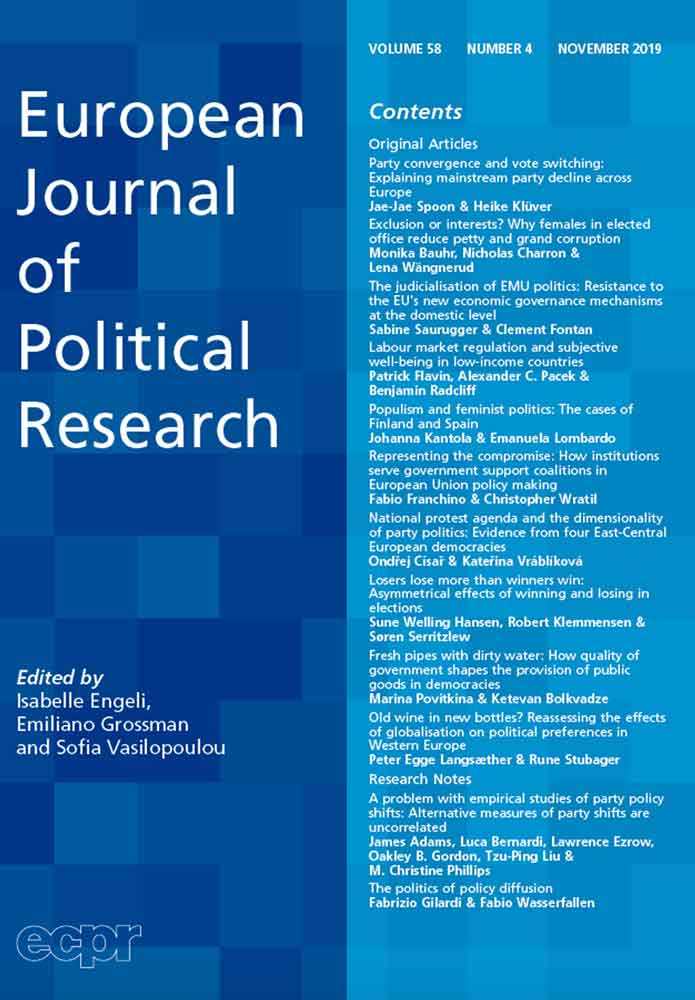 Party Convergence and Vote Switching: Explaining Mainstream Party Decline Across EuropeJae‐Jae Spoon and Heike KlüverEuropean Journal of Political Research, Nov 2019
Party Convergence and Vote Switching: Explaining Mainstream Party Decline Across EuropeJae‐Jae Spoon and Heike KlüverEuropean Journal of Political Research, Nov 2019How can one explain the significant vote losses of mainstream parties across Europe in recent years? In this article, it is argued that mainstream party convergence is an important determinant of the recent political and electoral volatility in European party systems. More specifically, it is hypothesised that as mainstream parties converge on the left‐right scale, voters will switch from supporting a mainstream party to a non‐mainstream party in the next election as they look for an alternative that better represents their ideological views. To test these theoretical expectations, data is combined from the Comparative Study of Electoral Systems and the Manifestos Project for nearly 15,000 vote choices of individual voters in 30 elections in 16 West and East European countries from 2001 until 2013. The findings have important implications for understanding the recent rise of non‐mainstream parties, the changing nature of party systems and the increasing complexity of cabinet formation across Europe.
@article{spoon_party_2019, title = {Party {Convergence} and {Vote} {Switching}: {Explaining} {Mainstream} {Party} {Decline} {Across} {Europe}}, shorttitle = {Party {Convergence} and {Vote} {Switching}}, author = {Spoon, Jae‐Jae and Klüver, Heike}, year = {2019}, month = nov, journal = {European Journal of Political Research}, volume = {58}, number = {4}, pages = {1021--1042}, doi = {10.1111/1475-6765.12331}, issn = {0304-4130, 1475-6765}, url = {https://ejpr.onlinelibrary.wiley.com/doi/10.1111/1475-6765.12331}, urldate = {2025-05-15}, language = {en}, } -
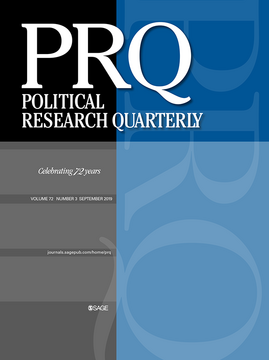 The Influence of Cause and Sectional Group Lobbying on Government ResponsivenessVincent Hopkins, Heike Klüver, and Mark PickupPolitical Research Quarterly, Sep 2019
The Influence of Cause and Sectional Group Lobbying on Government ResponsivenessVincent Hopkins, Heike Klüver, and Mark PickupPolitical Research Quarterly, Sep 2019Voters are increasingly concerned that special interests control the policy process. Yet, the literature on representation is more optimistic: elected officials face strong incentives to listen to voters—not just lobby groups—and this makes for more responsive policies. Building on recent work, we argue a more nuanced point: different types of groups have different effects on responsiveness. We show empirically that lobbying from “cause” groups—representing diffuse interests like climate change—strengthens responsiveness, while lobbying from “sectional” groups—representing industry and professional associations—has no observable effect. Our project uses a novel data set of Canadian lobbying registrations spanning fifteen policy areas from 1990 to 2009. Using a dynamic panel model, we test how interest group lobbying moderates the effect of voter issue attention on government spending. Our findings contribute to contemporary debates over the influence of organized groups, suggesting some interest groups may improve representation.
@article{hopkins_influence_2019, title = {The {Influence} of {Cause} and {Sectional} {Group} {Lobbying} on {Government} {Responsiveness}}, author = {Hopkins, Vincent and Klüver, Heike and Pickup, Mark}, year = {2019}, month = sep, journal = {Political Research Quarterly}, volume = {72}, number = {3}, pages = {623--636}, doi = {10.1177/1065912918796326}, issn = {1065-9129, 1938-274X}, url = {https://journals.sagepub.com/doi/10.1177/1065912918796326}, urldate = {2025-05-09}, language = {en}, data = {https://dataverse.harvard.edu/dataset.xhtml?persistentId=doi:10.7910/DVN/SEY6PL}, } -
 Explaining Interest Group Density Across Economic Sectors: Evidence from GermanyHeike Klüver and Elisabeth ZeidlerPolitical Studies, May 2019
Explaining Interest Group Density Across Economic Sectors: Evidence from GermanyHeike Klüver and Elisabeth ZeidlerPolitical Studies, May 2019Why does the number of interest groups vary across economic sectors? Interest groups are an important channel through which companies can transmit their policy preferences to decision-makers. However, empirical research shows that the number of interest groups varies considerably across sectors. We argue that the size and the wealth of the potential constituency as well as government activity positively affect interest group density. We test our theoretical expectations based on an unprecedented longitudinal analysis of interest groups that registered at the German Bundestag from 1978 until 2013 and show that the number of firms, the wealth of an economic sector, and government activity positively influence interest group density. However, we also find that the relationship between interest groups and legislative activity is reciprocal as legislative activity positively impacts the number of interest groups in an economic sector, but at the same time interest group density also positively affects legislative activity.
@article{kluver_explaining_2019, title = {Explaining {Interest} {Group} {Density} {Across} {Economic} {Sectors}: {Evidence} from {Germany}}, shorttitle = {Explaining {Interest} {Group} {Density} {Across} {Economic} {Sectors}}, author = {Klüver, Heike and Zeidler, Elisabeth}, year = {2019}, month = may, journal = {Political Studies}, volume = {67}, number = {2}, pages = {459--478}, doi = {10.1177/0032321718774685}, issn = {0032-3217, 1467-9248}, url = {https://journals.sagepub.com/doi/10.1177/0032321718774685}, urldate = {2025-05-15}, language = {en}, data = {https://dataverse.harvard.edu/dataset.xhtml?persistentId=doi:10.7910/DVN/Q5GGCF}, dataset = {lobbylist}, } -
 Are They Listening? Public Opinion, Interest Groups and Government ResponsivenessHeike Klüver and Mark PickupWest European Politics, Jan 2019
Are They Listening? Public Opinion, Interest Groups and Government ResponsivenessHeike Klüver and Mark PickupWest European Politics, Jan 2019Right-wing populist and far right parties are on the rise across Europe. While established parties are suffering dramatic electoral losses, right-wing parties are celebrating one electoral victory after another. To address their radical right challengers, many established parties have adopted a so-called ‘accommodative strategy’ by taking a more immigration-skeptical policy position. However, it is unclear whether such a strategy yields the expected benefits or whether such a position shift in turn hurts a party electorally. In this article, we find that mainstream left parties benefit from ‘going tough on immigration’ whereas it neither helps nor hurts mainstream right parties electorally. We arrive at this conclusion through an analysis of 16,811 vote choices in 15 elections in six countries from 1998 until 2013. Our findings have important implications for understanding what explains the rise of far right parties and the changing nature of electoral competition across Europe.
@article{kluver_are_2019, title = {Are {They} {Listening}? {Public} {Opinion}, {Interest} {Groups} and {Government} {Responsiveness}}, shorttitle = {Are {They} {Listening}?}, author = {Klüver, Heike and Pickup, Mark}, year = {2019}, month = jan, journal = {West European Politics}, volume = {42}, number = {1}, pages = {91--112}, doi = {10.1080/01402382.2018.1483662}, issn = {0140-2382, 1743-9655}, url = {https://www.tandfonline.com/doi/full/10.1080/01402382.2018.1483662}, urldate = {2025-05-15}, language = {en}, }
2018
-
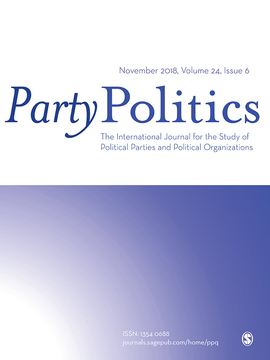 Minority Governments and Legislative Reliability: Evidence from Denmark and SwedenHeike Klüver and Radoslaw ZubekParty Politics, Nov 2018
Minority Governments and Legislative Reliability: Evidence from Denmark and SwedenHeike Klüver and Radoslaw ZubekParty Politics, Nov 2018When are minority cabinets effective? We study the extent to which minority cabinets demonstrate legislative reliability, that is, introduce to parliament the bills they have announced in their legislative agendas. We test hypotheses drawn from two theories of minority government effectiveness: the positional agenda power theory which emphasizes the central location of the minority cabinet in the policy space and the ideological proximity theory which stresses the importance of the ideological closeness of opposition parties to the government. In an analysis of over 1600 bills announced by Danish and Swedish minority cabinets in 19 legislative agendas published between 1998 and 2012, we find more support, overall, for the ideological proximity than for the positional agenda power model.
@article{kluver_minority_2018, title = {Minority {Governments} and {Legislative} {Reliability}: {Evidence} from {Denmark} and {Sweden}}, shorttitle = {Minority {Governments} and {Legislative} {Reliability}}, author = {Klüver, Heike and Zubek, Radoslaw}, year = {2018}, month = nov, journal = {Party Politics}, volume = {24}, number = {6}, pages = {719--730}, doi = {10.1177/1354068817695742}, issn = {1354-0688, 1460-3683}, url = {https://journals.sagepub.com/doi/10.1177/1354068817695742}, urldate = {2025-05-15}, language = {en}, } -
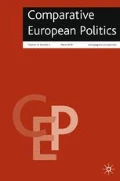 The Core or the Winset? Explaining Decision-Making Duration and Policy Change in the European UnionDietrich Drüner, Heike Klüver, Ellen Mastenbroek, and Gerald SchneiderComparative European Politics, Mar 2018
The Core or the Winset? Explaining Decision-Making Duration and Policy Change in the European UnionDietrich Drüner, Heike Klüver, Ellen Mastenbroek, and Gerald SchneiderComparative European Politics, Mar 2018This article examines to what extent different formal conceptualizations of ideological conflict can help to explain the capacity for and speed of policy change in the European Union (EU). We compare the core and the winset, two competing concepts based on the spatial theory of voting. The empirical analysis shows that the latter concept bears a strong and systematic influence on decision making in the EU. The smaller the winset containing the outcomes that a majority of actors in the Council of the EU prefers over the status quo, the longer a decision-making process lasts and the smaller the potential for policy change.
@article{druner_core_2018, title = {The {Core} or the {Winset}? {Explaining} {Decision}-{Making} {Duration} and {Policy} {Change} in the {European} {Union}}, shorttitle = {The {Core} or the {Winset}?}, author = {Drüner, Dietrich and Klüver, Heike and Mastenbroek, Ellen and Schneider, Gerald}, year = {2018}, month = mar, journal = {Comparative European Politics}, volume = {16}, number = {2}, pages = {271--289}, doi = {10.1057/cep.2015.26}, issn = {1472-4790, 1740-388X}, url = {http://link.springer.com/10.1057/cep.2015.26}, urldate = {2025-05-09}, language = {en}, }
2017
-
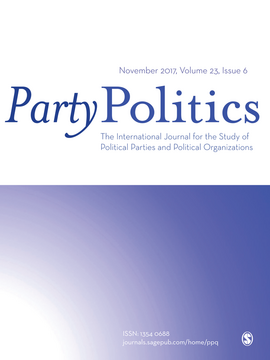 Challenges to Multiparty Governments: How Governing in Coalitions Affects Coalition Parties’ Responsiveness to VotersHeike Klüver and Jae-Jae SpoonParty Politics, Nov 2017
Challenges to Multiparty Governments: How Governing in Coalitions Affects Coalition Parties’ Responsiveness to VotersHeike Klüver and Jae-Jae SpoonParty Politics, Nov 2017How does governing in coalitions affect coalition parties’ responsiveness to voters? In this article, we seek to understand the relationship between political parties’ participation in multiparty governments and their responsiveness to voters. We argue that the extent to which coalition parties respond to policy priorities of voters is influenced by the divisiveness of policy issues within the cabinet and the ministerial responsibility for policies. To test our hypotheses, we combine data on the issue attention of 55 coalition parties from the Comparative Manifestos Project with data on government composition and data on the policy priorities of voters from the Comparative Study of Electoral Systems and various election studies in 45 elections across 16 European countries from 1972 to 2011. While we find that intra-cabinet divisiveness decreases coalition parties’ responsiveness, we find no effect for portfolio responsibility. Our findings shed light on the relationship between party competition and coalition governments and its implications for political representation.
@article{kluver_challenges_2017, title = {Challenges to {Multiparty} {Governments}: {How} {Governing} in {Coalitions} {Affects} {Coalition} {Parties}’ {Responsiveness} to {Voters}}, shorttitle = {Challenges to {Multiparty} {Governments}}, author = {Klüver, Heike and Spoon, Jae-Jae}, year = {2017}, month = nov, journal = {Party Politics}, volume = {23}, number = {6}, pages = {793--803}, doi = {10.1177/1354068815627399}, issn = {1354-0688, 1460-3683}, url = {https://journals.sagepub.com/doi/10.1177/1354068815627399}, urldate = {2025-05-09}, language = {en}, } -
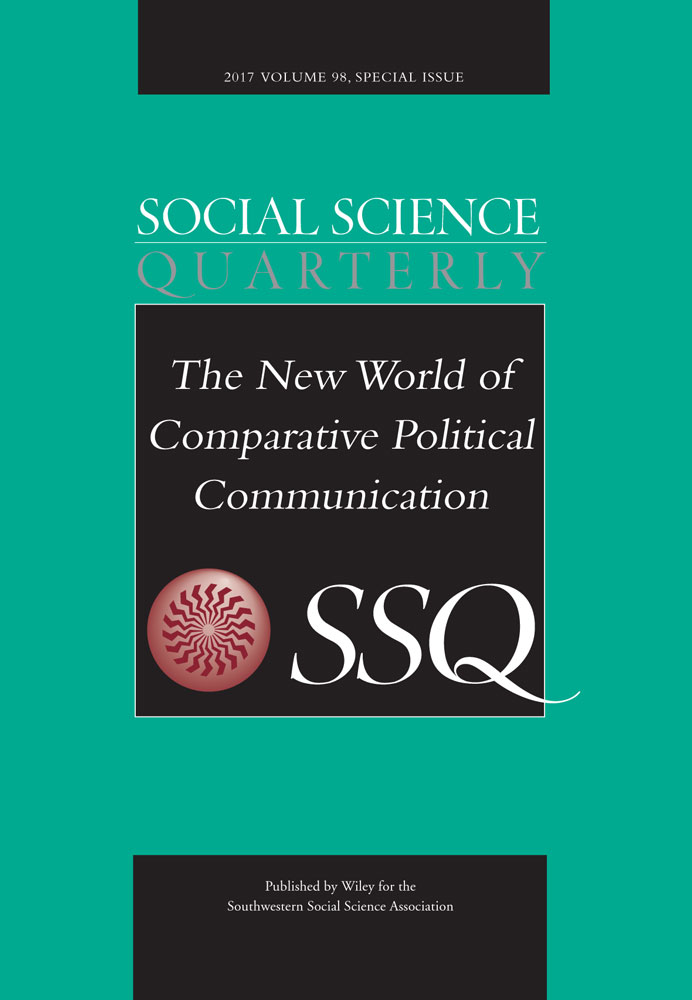 Where Have All the Leaders Gone? Evaluating the Dynamics of Parties’ Issue Attention in Coalition GovernmentsIñaki Sagarzazu and Heike KlüverSocial Science Quarterly, Sep 2017
Where Have All the Leaders Gone? Evaluating the Dynamics of Parties’ Issue Attention in Coalition GovernmentsIñaki Sagarzazu and Heike KlüverSocial Science Quarterly, Sep 2017Objective While selective issue emphasis is a widely recognized strategy of party competition, we have little knowledge about how coalition parties interact with each other when deciding which policy issues to emphasize. Therefore we ask: Who leads and who follows the issue agenda in coalition governments? Methods. We create an issue attention data set using quantitative text analysis from over 40,000 press releases. We use this data set and time series cross-section regression analysis to study the dynamics of coalition parties’ issue attention. Results. We find that junior coalition parties are more responsive to their senior partners than senior partners to their junior partners. Hence, while coalition partners generally follow each other, senior partners enjoy a stronger leadership role in the cabinet. Conclusion. Coalition parties indeed coordinate their issue priorities as they respond to each other’s issue agenda. However, due the asymmetric power distribution in coalition cabinets, it is not a negotiation process on equal footing.
@article{sagarzazu_where_2017, title = {Where {Have} {All} the {Leaders} {Gone}? {Evaluating} the {Dynamics} of {Parties}' {Issue} {Attention} in {Coalition} {Governments}}, shorttitle = {Where {Have} {All} the {Leaders} {Gone}?}, author = {Sagarzazu, Iñaki and Klüver, Heike}, year = {2017}, month = sep, journal = {Social Science Quarterly}, volume = {98}, number = {3}, pages = {1045--1060}, doi = {10.1111/ssqu.12437}, issn = {0038-4941, 1540-6237}, url = {https://onlinelibrary.wiley.com/doi/10.1111/ssqu.12437}, urldate = {2025-05-15}, copyright = {http://onlinelibrary.wiley.com/termsAndConditions\#vor}, language = {en}, } -
 Coalition Governments and Party Competition: Political Communication Strategies of Coalition PartiesIñaki Sagarzazu and Heike KlüverPolitical Science Research and Methods, Apr 2017
Coalition Governments and Party Competition: Political Communication Strategies of Coalition PartiesIñaki Sagarzazu and Heike KlüverPolitical Science Research and Methods, Apr 2017Coalition parties have to reconcile two competing logics: they need to demonstrate unity to govern together, but also have to emphasize their own profile to succeed in elections. We argue that the electoral cycle explains whether unity or differentiation prevails. While differentiation dominates at the beginning and the end of the legislative term in close proximity to elections, compromise dominates the middle of the term when coalition governments focus on enacting a common policy agenda. To test our theoretical claims, we draw on an innovative quantitative text analysis of more than 21,000 press releases published by coalition parties from 2000 until 2010.
@article{sagarzazu_coalition_2017, title = {Coalition {Governments} and {Party} {Competition}: {Political} {Communication} {Strategies} of {Coalition} {Parties}}, shorttitle = {Coalition {Governments} and {Party} {Competition}}, author = {Sagarzazu, Iñaki and Klüver, Heike}, year = {2017}, month = apr, journal = {Political Science Research and Methods}, volume = {5}, number = {2}, pages = {333--349}, doi = {10.1017/psrm.2015.56}, issn = {2049-8470, 2049-8489}, url = {https://www.cambridge.org/core/product/identifier/S2049847015000564/type/journal_article}, urldate = {2025-05-15}, copyright = {https://www.cambridge.org/core/terms}, language = {en}, data = {https://dataverse.harvard.edu/dataset.xhtml?persistentId=doi:10.7910/DVN/PZC0DM}, } -
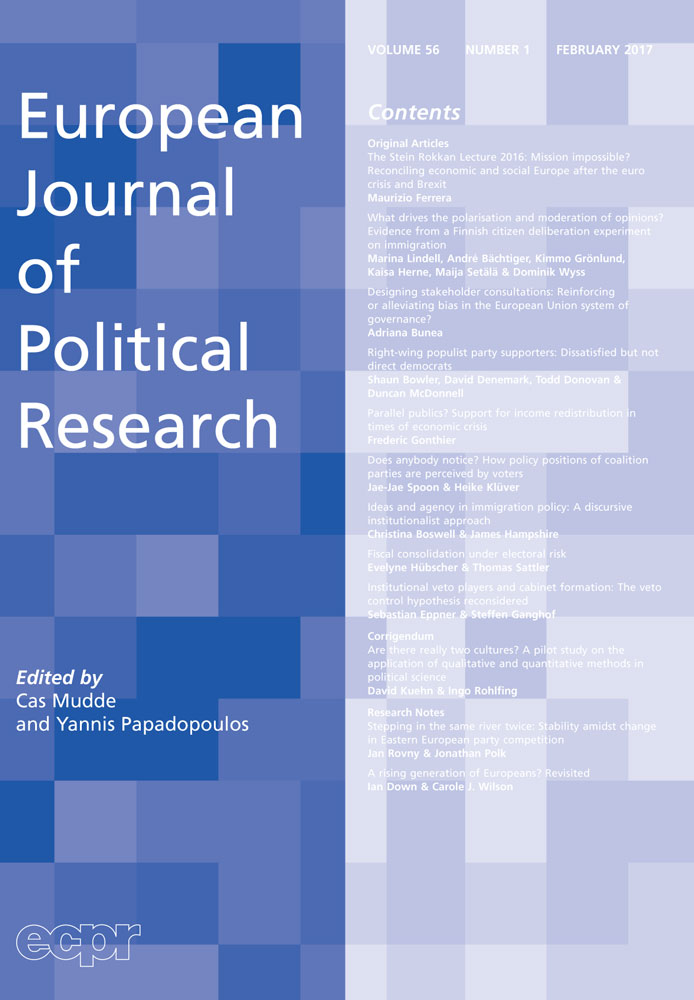 Does Anybody Notice? How Policy Positions of Coalition Parties Are Perceived by VotersJae‐Jae Spoon and Heike KlüverEuropean Journal of Political Research, Feb 2017
Does Anybody Notice? How Policy Positions of Coalition Parties Are Perceived by VotersJae‐Jae Spoon and Heike KlüverEuropean Journal of Political Research, Feb 2017Does governing in coalitions affect how coalition parties’ policy positions are perceived by voters? In this article, the authors seek to understand the relationship between parties’ participation in coalition governments and their perception by voters. Policy positions are an important instrument through which parties compete for the support of voters. However, it is unclear to what extent voters can correctly perceive the positions of parties when they govern together with other coalition partners. It is argued here that because of the blurred lines of responsibility in multiparty cabinets, it is difficult for voters to correctly perceive the positions of coalition parties. What is more, it is expected that the internal functioning of coalition cabinets affects the extent to which coalition parties struggle to get their message out to voters. It is hypothesized in the article that intra‐cabinet conflict is negatively related to misperception. To test their theoretical expectations, the authors combine data on the left‐right policy positions of political parties from the Comparative Manifestos Project with data on how these positions are perceived by voters gathered from the Comparative Study of Electoral Systems from 1996 to 2011. The findings shed light on the relationship between party competition and coalition governments, and its implications for political representation.
@article{spoon_does_2017, title = {Does {Anybody} {Notice}? {How} {Policy} {Positions} of {Coalition} {Parties} {Are} {Perceived} by {Voters}}, shorttitle = {Does {Anybody} {Notice}?}, author = {Spoon, Jae‐Jae and Klüver, Heike}, year = {2017}, month = feb, journal = {European Journal of Political Research}, volume = {56}, number = {1}, pages = {115--132}, doi = {10.1111/1475-6765.12169}, issn = {0304-4130, 1475-6765}, url = {https://ejpr.onlinelibrary.wiley.com/doi/10.1111/1475-6765.12169}, urldate = {2025-05-15}, copyright = {http://onlinelibrary.wiley.com/termsAndConditions\#vor}, language = {en}, }
2016
-
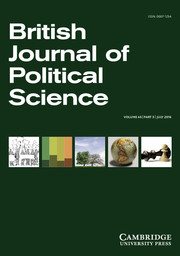 Who Responds? Voters, Parties and Issue AttentionHeike Klüver and Jae-Jae SpoonBritish Journal of Political Science, Jul 2016
Who Responds? Voters, Parties and Issue AttentionHeike Klüver and Jae-Jae SpoonBritish Journal of Political Science, Jul 2016Do parties listen to their voters? This article addresses this important question by moving beyond position congruence to explore whether parties respond to voters’ issue priorities. It argues that political parties respond to voters in their election manifestos, but that their responsiveness varies across different party types: namely, that large parties are more responsive to voters’ policy priorities, while government parties listen less to voters’ issue demands. The study also posits that niche parties are not generally more responsive to voter demands, but that they are more responsive to the concerns of their supporters in their owned issue areas. To test these theoretical expectations, the study combines data from the Comparative Manifestos Project with data on voters’ policy priorities from the Comparative Study of Electoral Systems and various national election studies across eighteen European democracies in sixty-three elections from 1972–2011. Our findings have important implications for understanding political representation and democratic linkage.
@article{kluver_who_2016, title = {Who {Responds}? {Voters}, {Parties} and {Issue} {Attention}}, shorttitle = {Who {Responds}?}, author = {Klüver, Heike and Spoon, Jae-Jae}, year = {2016}, month = jul, journal = {British Journal of Political Science}, volume = {46}, number = {3}, pages = {633--654}, doi = {10.1017/S0007123414000313}, issn = {0007-1234, 1469-2112}, url = {https://www.cambridge.org/core/product/identifier/S0007123414000313/type/journal_article}, urldate = {2025-05-09}, copyright = {https://www.cambridge.org/core/terms}, language = {en}, data = {https://www.cambridge.org/core/journals/british-journal-of-political-science/article/who-responds-voters-parties-and-issue-attention/B0FE670EF39AD2275D423F15CF5ABA39#supplementary-materials}, } -
 Setting the Agenda or Responding to Voters? Political Parties, Voters and Issue AttentionHeike Klüver and Iñaki SagarzazuWest European Politics, Mar 2016
Setting the Agenda or Responding to Voters? Political Parties, Voters and Issue AttentionHeike Klüver and Iñaki SagarzazuWest European Politics, Mar 2016Why do political parties prioritise some policy issues over others? While the issue ownership theory suggests that parties emphasise policy issues on which they have an advantage in order to increase the salience of these issues among voters, the riding the wave theory argues instead that parties respond to voters by highlighting policy issues that are salient in the minds of citizens. This study sheds new light on the selective issue emphasis of political parties by analysing issue attention throughout the entire electoral cycle. On the basis of a quantitative text analysis of more than 40,000 press releases published by German parties from 2000 until 2010, this article provides empirical support for the riding the wave theory. It shows that political parties take their cues from voters by responding to the issue priorities of their electorate. The results have important implications for political representation and the role that parties play in democracies.
@article{kluver_setting_2016, title = {Setting the {Agenda} or {Responding} to {Voters}? {Political} {Parties}, {Voters} and {Issue} {Attention}}, shorttitle = {Setting the {Agenda} or {Responding} to {Voters}?}, author = {Klüver, Heike and Sagarzazu, Iñaki}, year = {2016}, month = mar, journal = {West European Politics}, volume = {39}, number = {2}, pages = {380--398}, doi = {10.1080/01402382.2015.1101295}, issn = {0140-2382, 1743-9655}, url = {http://www.tandfonline.com/doi/full/10.1080/01402382.2015.1101295}, urldate = {2025-05-15}, language = {en}, } -
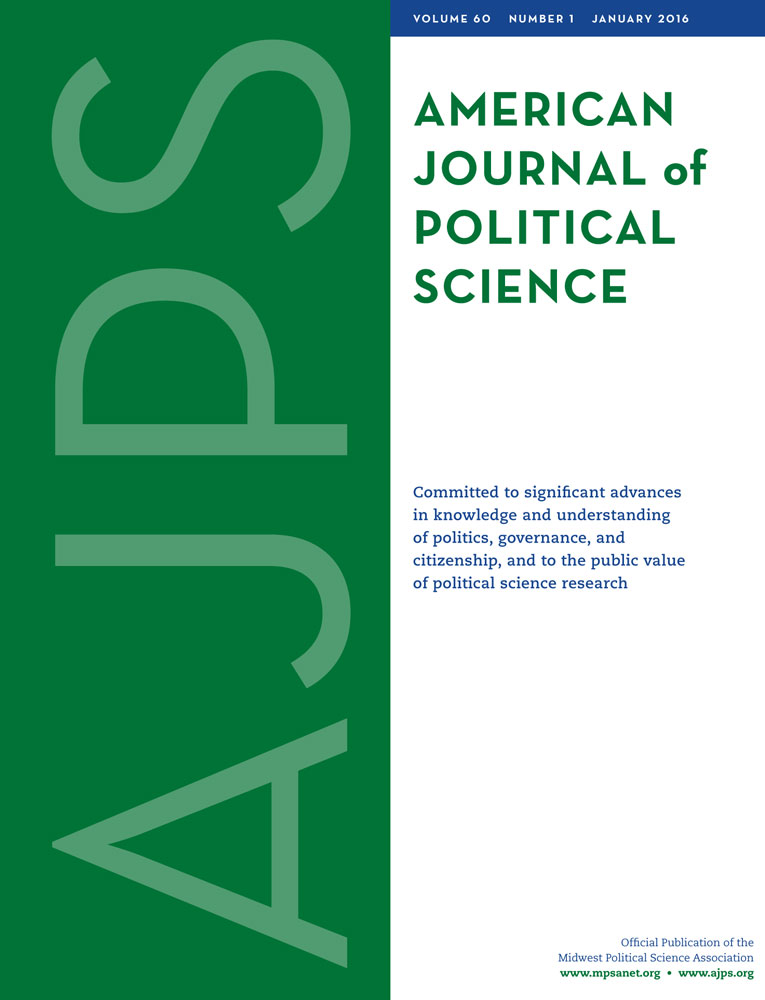 Voting Against Your Constituents? How Lobbying Affects RepresentationNathalie Giger and Heike KlüverAmerican Journal of Political Science, Jan 2016
Voting Against Your Constituents? How Lobbying Affects RepresentationNathalie Giger and Heike KlüverAmerican Journal of Political Science, Jan 2016Citizens delegate the representation of their political preferences to members of Parliament (MPs), who are supposed to represent their interests in the legislature. However, MPs are exposed to a variety of interest groups seeking to influence their voting behavior. We argue that interest groups influence how MPs cast their vote in Parliament, but that this effect varies across groups. While lobbying by sectional groups provides incentives for MPs to defect from their constituents, we expect that cause groups in fact strengthen the link between MPs and their voters. We test our argument based on an innovative study of 118 Swiss public referenda, which allows for directly comparing voter preferences with legislative voting of 448 MPs on these issues. Drawing on a multilevel regression analysis, this study shows that interest groups considerably affect the link between MPs and their voters. Our findings have important implications for our understanding of political representation.
@article{giger_voting_2016, title = {Voting {Against} {Your} {Constituents}? {How} {Lobbying} {Affects} {Representation}}, shorttitle = {Voting {Against} {Your} {Constituents}?}, author = {Giger, Nathalie and Klüver, Heike}, year = {2016}, month = jan, journal = {American Journal of Political Science}, volume = {60}, number = {1}, pages = {190--205}, doi = {10.1111/ajps.12183}, issn = {0092-5853, 1540-5907}, url = {https://onlinelibrary.wiley.com/doi/10.1111/ajps.12183}, urldate = {2025-05-09}, language = {en}, data = {https://dataverse.harvard.edu/dataset.xhtml?persistentId=doi:10.7910/DVN/29080}, }
2015
-
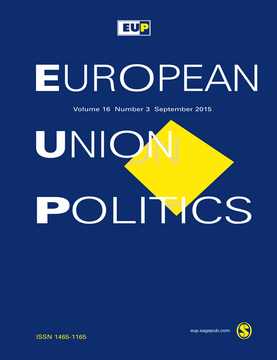 The Promises of Quantitative Text Analysis in Interest Group Research: A Reply to Bunea and IbenskasHeike KlüverEuropean Union Politics, Sep 2015
The Promises of Quantitative Text Analysis in Interest Group Research: A Reply to Bunea and IbenskasHeike KlüverEuropean Union Politics, Sep 2015Quantitative text analysis constitutes a promising new method that allows for measuring the policy positions and the lobbying success of interest groups by analyzing their submissions to legislative consultations ( Klüver, 2009 ). The use of quantitative text analysis allowed me to present a novel and unique research design which was the largest in scope at the time and resulted in important new insights regarding the determinants of lobbying success ( Klüver, 2009 , 2011 , 2013 ). In their recent article, Bunea and Ibenskas (2015) however question the usefulness of quantitative text analysis for studying interest groups and discuss several issues which in their view constitute important disadvantages of the technique. In this article I carefully discuss each of their arguments and show that none of their objections actually prevents scholars from successfully using quantitative text analysis to study interest groups in the European Union and beyond.
@article{kluver_promises_2015, title = {The {Promises} of {Quantitative} {Text} {Analysis} in {Interest} {Group} {Research}: {A} {Reply} to {Bunea} and {Ibenskas}}, shorttitle = {The {Promises} of {Quantitative} {Text} {Analysis} in {Interest} {Group} {Research}}, author = {Klüver, Heike}, year = {2015}, month = sep, journal = {European Union Politics}, volume = {16}, number = {3}, pages = {456--466}, doi = {10.1177/1465116515581669}, issn = {1465-1165, 1741-2757}, url = {https://journals.sagepub.com/doi/10.1177/1465116515581669}, urldate = {2025-05-15}, language = {en}, data = {https://journals.sagepub.com/doi/10.1177/1465116515581669}, } -
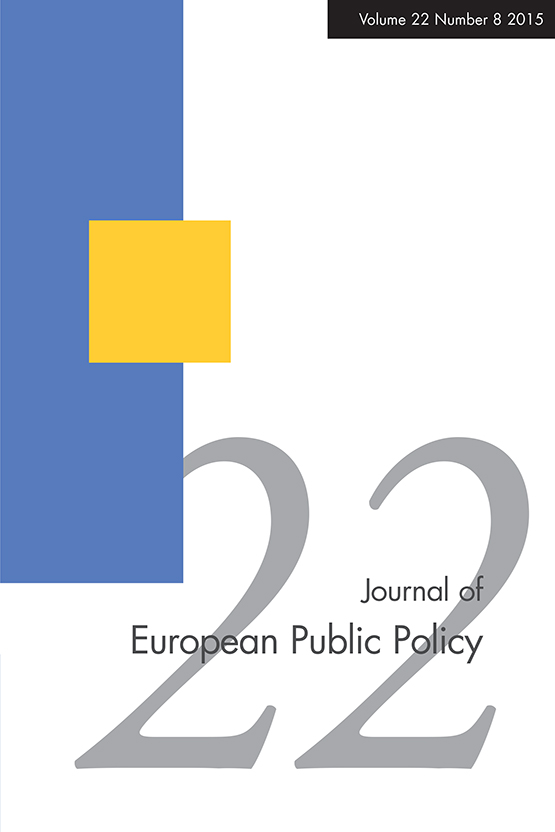 Images of an Unbiased Interest SystemDavid Lowery, Frank R. Baumgartner, Joost Berkhout, Jeffrey M. Berry, Darren Halpin, Marie Hojnacki, Heike Klüver, Beate Kohler-Koch, Jeremy Richardson, and Kay Lehman SchlozmanJournal of European Public Policy, Sep 2015
Images of an Unbiased Interest SystemDavid Lowery, Frank R. Baumgartner, Joost Berkhout, Jeffrey M. Berry, Darren Halpin, Marie Hojnacki, Heike Klüver, Beate Kohler-Koch, Jeremy Richardson, and Kay Lehman SchlozmanJournal of European Public Policy, Sep 2015Since political scientists were introduced to the concept of ‘the scope and bias of the pressure system’ by Schattschneider more than half a century ago, we have grappled with the lack of a standard against which to assess bias. Still, scholars have continued to address Schattschneider’s provocative claim. This means that they must have in their minds at least implicit images of the unknown state of an unbiased interest system. We uncover these implicit images in this analysis both for their own intrinsic interest and perhaps as a foundation for more progressive research on biases in interest representation. Ten scholars who have done considerable work on the politics of interest representation were asked to provide a brief description of what he or she would see as an unbiased interest system. After presenting each, we summarize the themes that emerged and discuss possible avenues for empirical research on bias.
@article{lowery_images_2015, title = {Images of an {Unbiased} {Interest} {System}}, author = {Lowery, David and Baumgartner, Frank R. and Berkhout, Joost and Berry, Jeffrey M. and Halpin, Darren and Hojnacki, Marie and Klüver, Heike and Kohler-Koch, Beate and Richardson, Jeremy and Schlozman, Kay Lehman}, year = {2015}, month = sep, journal = {Journal of European Public Policy}, volume = {22}, number = {8}, pages = {1212--1231}, doi = {10.1080/13501763.2015.1049197}, issn = {1350-1763, 1466-4429}, url = {http://www.tandfonline.com/doi/full/10.1080/13501763.2015.1049197}, urldate = {2025-05-15}, language = {en}, } -
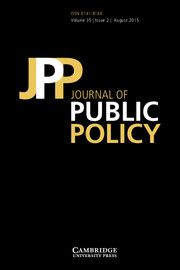 Measuring Interest Group Framing Strategies in Public Policy DebatesHeike Klüver and Christine MahoneyJournal of Public Policy, Aug 2015
Measuring Interest Group Framing Strategies in Public Policy DebatesHeike Klüver and Christine MahoneyJournal of Public Policy, Aug 2015Framing plays an important role in lobbying, as interest groups strategically highlight some aspects of policy proposals while ignoring others to shape policy debates in their favour. However, due to methodological difficulties, we have remarkably little systematic data about the framing strategies of interest groups. This article therefore proposes a new technique for measuring interest group framing that is based on a quantitative text analysis of interest group position papers and official policy documents. We test this novel methodological approach on the basis of two case studies in the areas of environmental and transport policy in the European Union. We are able to identify the frames employed by all interest groups mobilised in a debate and assess their effectiveness by studying to what extent decision-makers move closer to their policy positions over the course of the policy debate.
@article{kluver_measuring_2015, title = {Measuring {Interest} {Group} {Framing} {Strategies} in {Public} {Policy} {Debates}}, author = {Klüver, Heike and Mahoney, Christine}, year = {2015}, month = aug, journal = {Journal of Public Policy}, volume = {35}, number = {2}, pages = {223--244}, doi = {10.1017/S0143814X14000294}, issn = {0143-814X, 1469-7815}, url = {https://www.cambridge.org/core/product/identifier/S0143814X14000294/type/journal_article}, urldate = {2025-05-09}, copyright = {https://www.cambridge.org/core/terms}, language = {en}, } -
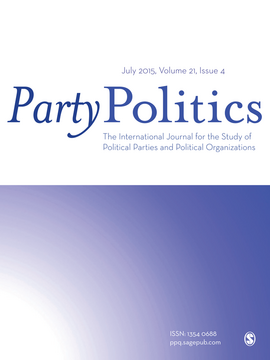 Bringing Salience Back in: Explaining Voting Defection in the European ParliamentHeike Klüver and Jae-Jae SpoonParty Politics, Jul 2015
Bringing Salience Back in: Explaining Voting Defection in the European ParliamentHeike Klüver and Jae-Jae SpoonParty Politics, Jul 2015What explains when Members of the European Parliament (MEPs) defect from their EP party group? While previous research has focused on the policy distance between an MEP’s national party and her party group, it has been overlooked that not all issues are equally important to national parties. As parties prioritize certain issues over others, we argue that it is both the distance and the salience of the issue for the MEP’s national party that explains defection. To test our theoretical claim, we explore more than 400,000 vote decisions across 1,948 different roll-call votes in four issue areas – agriculture, environment, social policy and external trade – from 1979 until 1999. To measure policy salience and distance, we combine roll-call analysis with data from the Euromanifestos Project. Our findings have important implications for understanding the dynamics of party competition and the role that national parties play in the European Parliament.
@article{kluver_bringing_2015, title = {Bringing {Salience} {Back} in: {Explaining} {Voting} {Defection} in the {European} {Parliament}}, shorttitle = {Bringing {Salience} {Back} in}, author = {Klüver, Heike and Spoon, Jae-Jae}, year = {2015}, month = jul, journal = {Party Politics}, volume = {21}, number = {4}, pages = {553--564}, doi = {10.1177/1354068813487114}, issn = {1354-0688, 1460-3683}, url = {https://journals.sagepub.com/doi/10.1177/1354068813487114}, urldate = {2025-05-15}, language = {en}, } -
 Legislative Pledges and Coalition GovernmentRadoslaw Zubek and Heike KlüverParty Politics, Jul 2015
Legislative Pledges and Coalition GovernmentRadoslaw Zubek and Heike KlüverParty Politics, Jul 2015When do coalitions do what they promise? Previous research has focused on the extent to which parties implement electoral pledges. In this article, we examine how coalition cabinets fulfil post-electoral legislative agendas. Many coalitions announce programmes identifying bills that they plan to introduce to parliament in the months ahead. Even though coalition parties publicly signal commitment to all such proposals, there is variation in the extent to which cabinets meet their own deadlines. We argue that pledge fulfilment is driven by differences in the divisiveness and salience of legislative initiatives. We test our theoretical expectations based on an empirical analysis of over 500 legislative pledges made by the Polish cabinet between 2008 and 2011. Our results confirm that pledges dealing with less divisive and more salient issues are likely to be fulfilled with less delay than those dealing with more divisive and less important issues.
@article{zubek_legislative_2015, title = {Legislative {Pledges} and {Coalition} {Government}}, author = {Zubek, Radoslaw and Klüver, Heike}, year = {2015}, month = jul, journal = {Party Politics}, volume = {21}, number = {4}, pages = {603--614}, doi = {10.1177/1354068813487126}, issn = {1354-0688, 1460-3683}, url = {https://journals.sagepub.com/doi/10.1177/1354068813487126}, urldate = {2025-05-15}, language = {en}, } -
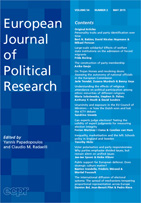 Voter Polarisation and Party Responsiveness: Why Parties Emphasise Divided Issues, but Remain Silent on Unified IssuesJae‐Jae Spoon and Heike KlüverEuropean Journal of Political Research, May 2015
Voter Polarisation and Party Responsiveness: Why Parties Emphasise Divided Issues, but Remain Silent on Unified IssuesJae‐Jae Spoon and Heike KlüverEuropean Journal of Political Research, May 2015How does voter polarisation affect party responsiveness? Previous research has shown that political parties emphasise political issues that are important to their voters. However, it is posited in this article that political parties are not equally responsive to citizen demands across all issue areas. The hypothesis is that party responsiveness varies considerably with the preference configuration of the electorate. More specifically, it is argued that party responsiveness increases with the polarisation of issues among voters. To test these theoretical expectations, party responsiveness is analysed across nine West European countries from 1982 until 2013. Data on voter attention and voter preferences with regard to specific policy issues from a variety of national election studies is combined with Comparative Manifestos Project data on parties’ emphasis of these issues in their election manifestos. The findings have major implications for understanding party competition and political representation in Europe.
@article{spoon_voter_2015, title = {Voter {Polarisation} and {Party} {Responsiveness}: {Why} {Parties} {Emphasise} {Divided} {Issues}, but {Remain} {Silent} on {Unified} {Issues}}, shorttitle = {Voter {Polarisation} and {Party} {Responsiveness}}, author = {Spoon, Jae‐Jae and Klüver, Heike}, year = {2015}, month = may, journal = {European Journal of Political Research}, volume = {54}, number = {2}, pages = {343--362}, doi = {10.1111/1475-6765.12087}, issn = {0304-4130, 1475-6765}, url = {https://ejpr.onlinelibrary.wiley.com/doi/10.1111/1475-6765.12087}, urldate = {2025-05-15}, copyright = {http://onlinelibrary.wiley.com/termsAndConditions\#vor}, language = {en}, } -
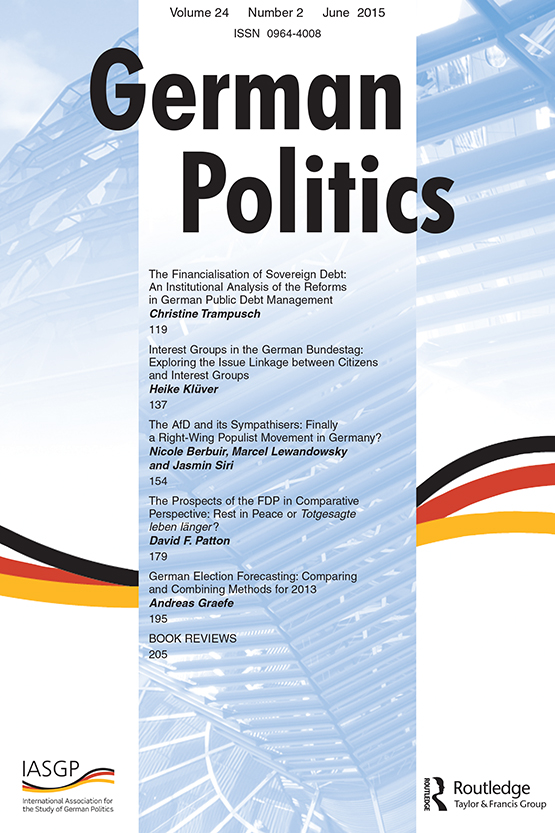 Interest Groups in the German Bundestag: Exploring the Issue Linkage Between Citizens and Interest GroupsHeike KlüverGerman Politics, Apr 2015
Interest Groups in the German Bundestag: Exploring the Issue Linkage Between Citizens and Interest GroupsHeike KlüverGerman Politics, Apr 2015Do interest groups adjust their activity in response to public opinion? While previous studies have primarily focused on the link between voters, political parties and governments, interest groups have largely been ignored. This article therefore examines how public opinion affects interest group activity. It is argued that interest group activity is a bottom–up process in which interest groups respond to the issue priorities of citizens. Bringing together panel data on citizen concerns with longitudinal data on interest group issue attention, this article examines the issue linkage between citizens and interest groups in Germany from 1984 until 2010 in two different policy domains. Based on a time-series cross-section analysis, it is shown that issue attention of citizens precedes the registration of interest groups in the Bundestag indicating that interest groups play an important role in issue evolution and political representation.
@article{kluver_interest_2015, title = {Interest {Groups} in the {German} {Bundestag}: {Exploring} the {Issue} {Linkage} {Between} {Citizens} and {Interest} {Groups}}, shorttitle = {Interest {Groups} in the {German} {Bundestag}}, author = {Klüver, Heike}, year = {2015}, month = apr, journal = {German Politics}, volume = {24}, number = {2}, pages = {137--153}, doi = {10.1080/09644008.2015.1024238}, issn = {0964-4008, 1743-8993}, url = {http://www.tandfonline.com/doi/full/10.1080/09644008.2015.1024238}, urldate = {2025-05-15}, language = {en}, data = {https://dataverse.harvard.edu/dataset.xhtml?persistentId=doi:10.7910/DVN/Q5GGCF}, dataset = {lobbylist}, } -
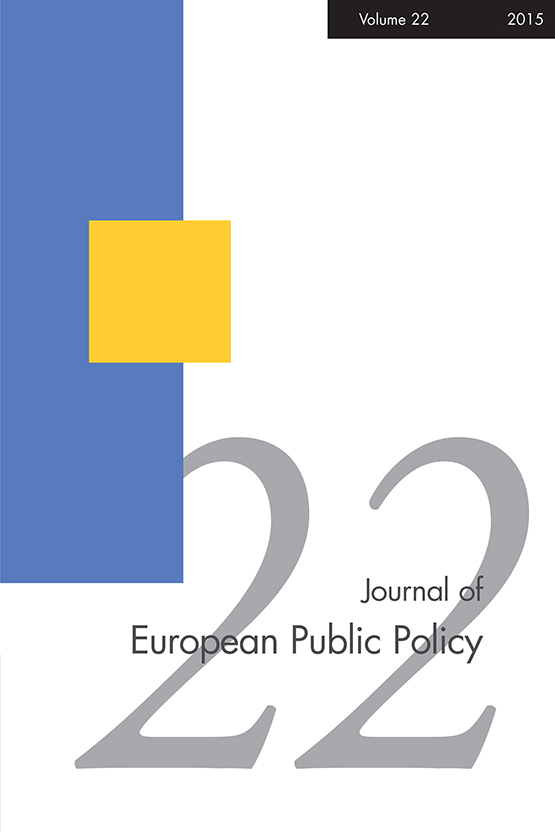 Legislative Lobbying in Context: Towards a Conceptual Framework of Interest Group Lobbying in the European UnionHeike Klüver, Caelesta Braun, and Jan BeyersJournal of European Public Policy, Apr 2015
Legislative Lobbying in Context: Towards a Conceptual Framework of Interest Group Lobbying in the European UnionHeike Klüver, Caelesta Braun, and Jan BeyersJournal of European Public Policy, Apr 2015We outline a conceptual framework that identifies and characterizes the contextual nature of interest group politics in the European Union (EU) to better understand variation in interest group mobilization, lobbying strategies and interest group influence. We focus on two sets of contextual factors that affect EU interest group lobbying. First, we argue that interest group activities are shaped by several policy-related factors, namely the complexity, the policy type, the status quo, the salience and the degree of conflict characterizing legislative proposals and the associated issues. Second, we posit that lobbying in the EU is affected by institutional factors that vary within the EU political system, such as the institutional fragmentation within the European Commission and the European Parliament and across different national political systems depending on the patterns of interest intermediation or the vertical and horizontal distribution of powers. Finally, we theorize about the interrelationship between contextual features and interest group properties and summarize the findings of the collection.
@article{kluver_legislative_2015, title = {Legislative {Lobbying} in {Context}: {Towards} a {Conceptual} {Framework} of {Interest} {Group} {Lobbying} in the {European} {Union}}, shorttitle = {Legislative {Lobbying} in {Context}}, author = {Klüver, Heike and Braun, Caelesta and Beyers, Jan}, year = {2015}, month = apr, journal = {Journal of European Public Policy}, volume = {22}, number = {4}, pages = {447--461}, doi = {10.1080/13501763.2015.1008792}, issn = {1350-1763, 1466-4429}, url = {http://www.tandfonline.com/doi/abs/10.1080/13501763.2015.1008792}, urldate = {2025-05-15}, language = {en}, } -
 Framing in Context: How Interest Groups Employ Framing to Lobby the European CommissionHeike Klüver, Christine Mahoney, and Marc OpperJournal of European Public Policy, Apr 2015
Framing in Context: How Interest Groups Employ Framing to Lobby the European CommissionHeike Klüver, Christine Mahoney, and Marc OpperJournal of European Public Policy, Apr 2015Framing plays an important role in public policy. Interest groups strategically highlight some aspects of a policy proposal while ignoring others in order to gain an advantage in the policy debate. However, we know remarkably little about how interest groups choose their frames. This contribution therefore studies the determinants of frame choice during the policy formulation stage in the European Union. We argue that frame choice is a complex process which is simultaneously affected by interest groups as well as contextual characteristics. With regard to interest group characteristics, we expect that frame choice varies systematically across actor type. With regard to contextual characteristics, we hypothesize that the frames that interest groups employ are specifically tailored towards the DGs in charge of drafting the proposal. Our theoretical expectations are tested based on a new and innovative dataset on frame choice of more than 3,000 interest groups in 44 policy debates.
@article{kluver_framing_2015, title = {Framing in Context: How Interest Groups Employ Framing to Lobby the {European} {Commission}}, shorttitle = {Framing in context}, author = {Klüver, Heike and Mahoney, Christine and Opper, Marc}, year = {2015}, month = apr, journal = {Journal of European Public Policy}, volume = {22}, number = {4}, pages = {481--498}, doi = {10.1080/13501763.2015.1008550}, issn = {1350-1763, 1466-4429}, url = {http://www.tandfonline.com/doi/abs/10.1080/13501763.2015.1008550}, urldate = {2025-05-15}, language = {en}, }
2014
-
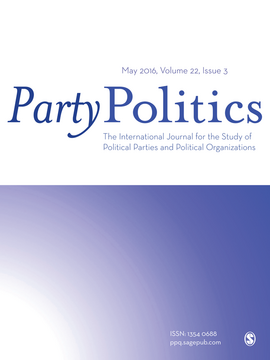 Bicameralism, Intra-Party Bargaining, and the Formation of Party Policy PositionsHanna Bäck, Marc Debus, and Heike KlüverParty Politics, Sep 2014
Bicameralism, Intra-Party Bargaining, and the Formation of Party Policy PositionsHanna Bäck, Marc Debus, and Heike KlüverParty Politics, Sep 2014How do political parties arrive at their policy positions? We conceptualize position formation in federalist countries as an intra-party bargaining process in which subnational parties compete with each other in an attempt to get their own positions into their national party manifesto. Drawing on theories about inter-party bargaining over ministerial portfolios, we hypothesize that the bargaining success of subnational parties depends on their parliamentary strength. We evaluate our hypotheses based on a comprehensive dataset on policy positions of national and subnational parties in Germany from 1990 until 2009. Our results show that German subnational parties that are powerful in the second parliamentary chamber (Bundesrat) are particularly successful in shaping the manifesto of their national party. The findings have important implications for our understanding of intra-party politics and position formation within political parties in Germany more specifically and federalist countries more generally.
@article{back_bicameralism_2014, title = {Bicameralism, {Intra}-{Party} {Bargaining}, and the {Formation} of {Party} {Policy} {Positions}}, author = {Bäck, Hanna and Debus, Marc and Klüver, Heike}, year = {2014}, month = sep, journal = {Party Politics}, volume = {22}, number = {3}, pages = {405--417}, doi = {10.1177/1354068814549343}, url = {https://journals.sagepub.com/doi/abs/10.1177/1354068814549343}, language = {en}, } -
 Do Parties Respond? How Electoral Context Influences Party ResponsivenessJae-Jae Spoon and Heike KlüverElectoral Studies, Sep 2014
Do Parties Respond? How Electoral Context Influences Party ResponsivenessJae-Jae Spoon and Heike KlüverElectoral Studies, Sep 2014How responsive are political parties to the issue priorities of voters? While there are numerous studies that examine policy position congruence between parties and voters or government responsiveness, we know little about the extent to which parties adjust their policy priorities to the issue concerns of voters. Following saliency and issue ownership theory, we argue that political parties listen to their voters by emphasizing policy issues in their election manifestos that have been prioritized by citizens. However, in line with second-order election theory, we expect that issue responsiveness varies with the electoral context. To test our theoretical expectations, we generated a novel dataset that combines data on issue attention of political parties from the Comparative Manifesto and the Euromanifesto projects with data on policy priorities of voters from the European Election Studies, the Comparative Study of Electoral Systems and various national election studies. We empirically test our theoretical claims based on a comprehensive analysis of 104 parties from 17 countries competing in 84 national and European elections from 1986 to 2011. Our findings have important implications for political representation in Europe.
@article{spoon_parties_2014, title = {Do {Parties} {Respond}? {How} {Electoral} {Context} {Influences} {Party} {Responsiveness}}, shorttitle = {Do {Parties} {Respond}?}, author = {Spoon, Jae-Jae and Klüver, Heike}, year = {2014}, month = sep, journal = {Electoral Studies}, volume = {35}, pages = {48--60}, doi = {10.1016/j.electstud.2014.04.014}, issn = {02613794}, url = {https://linkinghub.elsevier.com/retrieve/pii/S0261379414000547}, urldate = {2025-05-15}, language = {en}, } -
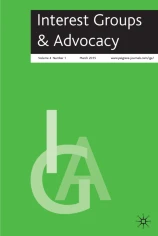 Identifying Frames: A Comparison of Research MethodsFrida Boräng, Rainer Eising, Heike Klüver, Christine Mahoney, Daniel Naurin, Daniel Rasch, and Patrycja RozbickaInterest Groups & Advocacy, Jun 2014
Identifying Frames: A Comparison of Research MethodsFrida Boräng, Rainer Eising, Heike Klüver, Christine Mahoney, Daniel Naurin, Daniel Rasch, and Patrycja RozbickaInterest Groups & Advocacy, Jun 2014Framing plays an important role in public policy. Interest groups strategically highlight some aspects of a policy proposal while downplaying others in order to steer the policy debate in a favorable direction. Despite the importance of framing, we still know relatively little about the framing strategies of interest groups due to methodological difficulties that have prevented scholars from systematically studying interest group framing across a large number of interest groups and multiple policy debates. This article therefore provides an overview of three novel research methods that allow researchers to systematically measure interest group frames. More specifically, this article introduces a word-based quantitative text analysis technique, a manual, computer-assisted content analysis approach and face-to-face interviews designed to systematically identify interest group frames. The results generated by all three techniques are compared on the basis of a case study of interest group framing in an environmental policy debate in the European Union.
@article{borang_identifying_2014, title = {Identifying {Frames}: {A} {Comparison} of {Research} {Methods}}, shorttitle = {Identifying {Frames}}, author = {Boräng, Frida and Eising, Rainer and Klüver, Heike and Mahoney, Christine and Naurin, Daniel and Rasch, Daniel and Rozbicka, Patrycja}, year = {2014}, month = jun, journal = {Interest Groups \& Advocacy}, volume = {3}, number = {2}, pages = {188--201}, doi = {10.1057/iga.2014.12}, issn = {2047-7414, 2047-7422}, url = {http://link.springer.com/10.1057/iga.2014.12}, urldate = {2025-05-09}, language = {en}, }
2013
-
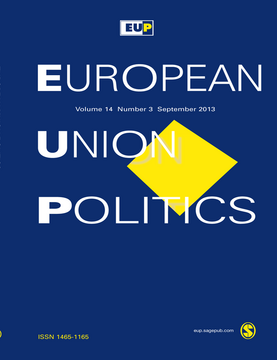 Ideological Congruency and Decision-Making Speed: The Effect of Partisanship Across European Union InstitutionsHeike Klüver and Iñaki SagarzazuEuropean Union Politics, Sep 2013
Ideological Congruency and Decision-Making Speed: The Effect of Partisanship Across European Union InstitutionsHeike Klüver and Iñaki SagarzazuEuropean Union Politics, Sep 2013How does ideological congruency affect the speed of legislative decision-making in the European Union? Despite the crucial importance of actor preferences, the effect of partisan alignments and ideological composition of the European institutions has largely been neglected. However, we argue that the ideological congruence between legislative bodies has an important effect on the duration of policy-making. We test our theoretical expectations based on a large new dataset on decision-making speed in the European Union using event history analysis. The findings confirm our theoretical claim indicating that the ideological distance between the European institutions slows down policy-making which has important implications for the problem-solving capacity of political systems more generally.
@article{kluver_ideological_2013, title = {Ideological {Congruency} and {Decision}-{Making} {Speed}: {The} {Effect} of {Partisanship} {Across} {European} {Union} {Institutions}}, shorttitle = {Ideological {Congruency} and {Decision}-{Making} {Speed}}, author = {Klüver, Heike and Sagarzazu, Iñaki}, year = {2013}, month = sep, journal = {European Union Politics}, volume = {14}, number = {3}, pages = {388--407}, doi = {10.1177/1465116512472938}, issn = {1465-1165, 1741-2757}, url = {https://journals.sagepub.com/doi/10.1177/1465116512472938}, urldate = {2025-05-09}, language = {en}, data = {https://journals.sagepub.com/doi/10.1177/1465116512472938#supplementarymaterial}, } -
 Explaining Policy Position Choice of Europarties: The Effect of Legislative ResourcesHeike Klüver and Toni RodonBritish Journal of Political Science, Jul 2013
Explaining Policy Position Choice of Europarties: The Effect of Legislative ResourcesHeike Klüver and Toni RodonBritish Journal of Political Science, Jul 2013While Europarties have received increasing attention in recent years, little is known about how they arrive at common policy positions, given their strong internal ideological heterogeneity. In order to explain position formation within Europarties, this article argues that national parties compete with each other in an attempt to upload their own policy positions to their Europarty. The article hypothesizes that their ability to succeed in these attempts depends on their legislative resources. The argument is tested by analysing position formation within the four major Europarties for all European Parliament elections between 1979 and 2004. The empirical results confirm that position choice is skewed towards parties with a large seat share, which has important implications for political representation in Europe.
@article{kluver_explaining_2013, title = {Explaining {Policy} {Position} {Choice} of {Europarties}: {The} {Effect} of {Legislative} {Resources}}, shorttitle = {Explaining {Policy} {Position} {Choice} of {Europarties}}, author = {Klüver, Heike and Rodon, Toni}, year = {2013}, month = jul, journal = {British Journal of Political Science}, volume = {43}, number = {3}, pages = {629--650}, doi = {10.1017/S0007123412000543}, issn = {0007-1234, 1469-2112}, url = {https://www.cambridge.org/core/product/identifier/S0007123412000543/type/journal_article}, urldate = {2025-05-09}, copyright = {https://www.cambridge.org/core/terms}, language = {en}, data = {https://www.cambridge.org/core/journals/british-journal-of-political-science/article/explaining-policy-position-choice-of-europarties-the-effect-of-legislative-resources/950BD8BEFB99ECCEEE20FBA2F16CADB6#supplementary-materials}, } -
 Opening the Black Box: The Professionalization of Interest Groups in the European UnionHeike Klüver and Sabine SauruggerInterest Groups & Advocacy, Jun 2013
Opening the Black Box: The Professionalization of Interest Groups in the European UnionHeike Klüver and Sabine SauruggerInterest Groups & Advocacy, Jun 2013Does professionalization vary across interest group type? Even though an empirical assessment of interest group professionalization is crucial to understand their potential for enhancing the democratic legitimacy of the European Union, little is known about the internal configuration of interest groups. Although some argue that professionalization differs systematically across interest group type, others suggest that institutional pressures lead to converging professionalization patterns, so that cause groups and sectional groups are similarly professionalized. However, these assertions are based on case studies focusing only on a small number of interest groups, which makes it difficult to draw general conclusions. To overcome this important shortcoming, we provide an empirical analysis of professionalization patterns that is based on a comprehensive survey conducted among a wide variety of interest groups. Our findings indicate that professionalization patterns do not vary systematically across interest group type. By contrast, cause groups and sectional groups are similarly professionalized.
@article{kluver_opening_2013, title = {Opening the {Black} {Box}: {The} {Professionalization} of {Interest} {Groups} in the {European} {Union}}, shorttitle = {Opening the {Black} {Box}}, author = {Klüver, Heike and Saurugger, Sabine}, year = {2013}, month = jun, journal = {Interest Groups \& Advocacy}, volume = {2}, number = {2}, pages = {185--205}, doi = {10.1057/iga.2013.2}, issn = {2047-7414, 2047-7422}, url = {http://link.springer.com/10.1057/iga.2013.2}, urldate = {2025-05-15}, copyright = {http://www.springer.com/tdm}, language = {en}, } -
 Lobbying as a Collective Enterprise: Winners and Losers of Policy Formulation in the European UnionHeike KlüverJournal of European Public Policy, Jan 2013
Lobbying as a Collective Enterprise: Winners and Losers of Policy Formulation in the European UnionHeike KlüverJournal of European Public Policy, Jan 2013Why does lobbying success in the European Union (EU) vary across interest groups? Even though this question is central to the study of EU policy-making, only few have dealt with it. The small number of existing studies is moreover characterized by a multitude of hypotheses and contradictory findings. This article aims to overcome these shortcomings by presenting a theoretical exchange model that identifies information supply, citizen support and economic power of entire lobbying camps as the major determinants of lobbying success. The hypotheses are empirically evaluated based on a large new dataset. By combining a quantitative text analysis of interest group submissions to Commission consultations with an online survey among interest groups, the theoretical expectations are tested across a large number of policy issues and interest groups while controlling for individual interest group and issue characteristics. The empirical analysis confirms the theoretical expectations indicating that lobbying is a collective enterprise.
@article{kluver_lobbying_2013-1, title = {Lobbying as a {Collective} {Enterprise}: {Winners} and {Losers} of {Policy} {Formulation} in the {European} {Union}}, shorttitle = {Lobbying as a {Collective} {Enterprise}}, author = {Klüver, Heike}, year = {2013}, month = jan, journal = {Journal of European Public Policy}, volume = {20}, number = {1}, pages = {59--76}, doi = {10.1080/13501763.2012.699661}, issn = {1350-1763, 1466-4429}, url = {http://www.tandfonline.com/doi/abs/10.1080/13501763.2012.699661}, urldate = {2025-05-15}, language = {en}, }
2012
-
 Biasing Politics? Interest Group Participation in EU Policy-MakingHeike KlüverWest European Politics, Sep 2012
Biasing Politics? Interest Group Participation in EU Policy-MakingHeike KlüverWest European Politics, Sep 2012Does lobbying success in the European Union vary systematically across interest group type? Interest groups lobby the European institutions in order to achieve policy decisions that are in line with their own preferences. While some argue that different types of interest groups are equally able to shape European policy-making, others contend that lobbying success is systematically biased towards some powerful interest groups. The empirical evidence is contradictory as previous studies focused either on a specific interest group type or on a specific policy area so that it is difficult to draw general conclusions. This study therefore presents an extensive empirical analysis of lobbying success across a wide variety of interest groups and policy issues by combining a quantitative text analysis of Commission consultations with an online survey among interest groups. The findings are promising as they indicate that lobbying success does not vary systematically across interest group type.
@article{kluver_biasing_2012, title = {Biasing {Politics}? {Interest} {Group} {Participation} in {EU} {Policy}-{Making}}, shorttitle = {Biasing {Politics}?}, author = {Klüver, Heike}, year = {2012}, month = sep, journal = {West European Politics}, volume = {35}, number = {5}, pages = {1114--1133}, doi = {10.1080/01402382.2012.706413}, issn = {0140-2382, 1743-9655}, url = {http://www.tandfonline.com/doi/abs/10.1080/01402382.2012.706413}, urldate = {2025-05-09}, language = {en}, } -
 Informational Lobbying in the European Union: The Effect of Organisational CharacteristicsHeike KlüverWest European Politics, May 2012
Informational Lobbying in the European Union: The Effect of Organisational CharacteristicsHeike KlüverWest European Politics, May 2012Information supply is an important instrument through which interest groups can exert influence on political decisions. However, information supply to decision-makers varies extensively across interest groups despite the common objective to influence policy-making. Drawing on resource mobilisation and organisational theory, a new theoretical framework is developed that identifies organisational characteristics, more specifically the resources, the functional differentiation, the professionalisation and the decentralisation of interest groups as determinants of information supply. These theoretical expectations are tested based on a large new dataset. Using multilevel modelling, this article examines information supply to the European Commission across a large number of policy issues and interest groups by combining an analysis of consultation submissions with a survey conducted among interest groups. The findings confirm the theoretical expectations suggesting that interest groups cannot equally exploit their access to decision-makers, but that resource endowment and organisational structures play a crucial role for effective informational lobbying.
@article{kluver_informational_2012, title = {Informational {Lobbying} in the {European} {Union}: {The} {Effect} of {Organisational} {Characteristics}}, shorttitle = {Informational {Lobbying} in the {European} {Union}}, author = {Klüver, Heike}, year = {2012}, month = may, journal = {West European Politics}, volume = {35}, number = {3}, pages = {491--510}, doi = {10.1080/01402382.2012.665737}, issn = {0140-2382, 1743-9655}, url = {http://www.tandfonline.com/doi/abs/10.1080/01402382.2012.665737}, urldate = {2025-05-09}, language = {en}, } -
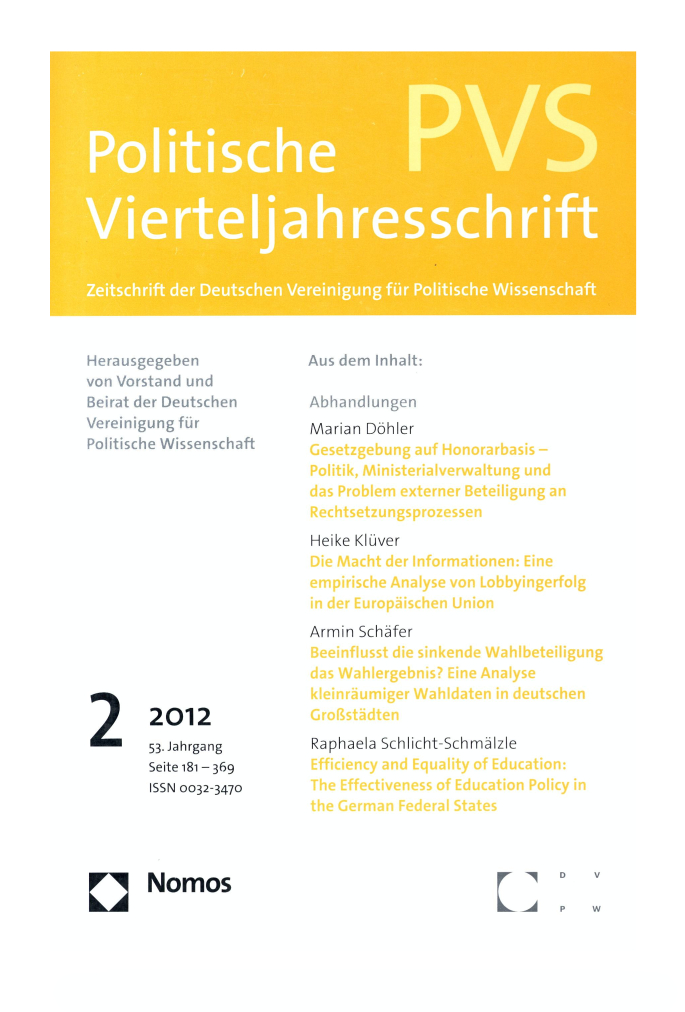 Die Macht der Informationen: Eine Empirische Analyse von Lobbyingerfolg in der Europäischen UnionHeike KlüverPolitische Vierteljahresschrift, May 2012
Die Macht der Informationen: Eine Empirische Analyse von Lobbyingerfolg in der Europäischen UnionHeike KlüverPolitische Vierteljahresschrift, May 2012Why are some interest groups able to successfully feed their preferences into the policy-making process in the European Union whereas others fail in their lobbying attempts? This study argues that lobbying success can largely be explained by the information that interest groups supply to the European Commission, the Council and the European Parliament. What is decisive is however not the provision of information by individual interest groups, but the information supply by entire lobbying coalitions composed of interest groups fighting for the same policy objective. Based on a quantitative text analysis of Commission consultations, the theoretical expectations are empirically tested based on a multilevel analysis of 2696 interest groups and 56 policy initiatives.
@article{kluver_macht_2012, title = {Die {Macht} der {Informationen}: {Eine} {Empirische} {Analyse} von {Lobbyingerfolg} in der {Europäischen} {Union}}, shorttitle = {Die {Macht} {Der} {Informationen}}, author = {Klüver, Heike}, year = {2012}, journal = {Politische Vierteljahresschrift}, volume = {53}, number = {2}, pages = {211--239}, doi = {10.5771/0032-3470-2012-2-211}, issn = {0032-3470}, url = {http://www.nomos-elibrary.de/index.php?doi=10.5771/0032-3470-2012-2-211}, urldate = {2025-05-09}, }
2011
-
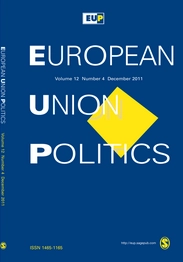 The Contextual Nature of Lobbying: Explaining Lobbying Success in the European UnionHeike KlüverEuropean Union Politics, Dec 2011
The Contextual Nature of Lobbying: Explaining Lobbying Success in the European UnionHeike KlüverEuropean Union Politics, Dec 2011Why are some interest groups able to lobby political decisions successfully whereas others are not? This article suggests that the issue context is an important source of variation because it can facilitate or hamper the ability of interest groups to lobby decision-makers successfully. In order to test the effect of issue characteristics, this article draws on a new, unprecedented data set of interest group lobbying in the European Union. Using quantitative text analysis to analyse Commission consultations, this article studies lobbying success across 2696 interest groups and 56 policy issues. The findings indicate that lobbying success indeed varies with the issue context, depending on the relative size of lobbying coalitions and the salience of policy issues, whereas individual group characteristics do not exhibit any systematic effect.
@article{kluver_contextual_2011, title = {The {Contextual} {Nature} of {Lobbying}: {Explaining} {Lobbying} {Success} in the {European} {Union}}, shorttitle = {The {Contextual} {Nature} of {Lobbying}}, author = {Klüver, Heike}, year = {2011}, month = dec, journal = {European Union Politics}, volume = {12}, number = {4}, pages = {483--506}, doi = {10.1177/1465116511413163}, issn = {1465-1165, 1741-2757}, url = {https://journals.sagepub.com/doi/10.1177/1465116511413163}, urldate = {2025-05-09}, language = {en}, data = {https://journals.sagepub.com/doi/10.1177/1465116511413163}, }
2010
-
 Europeanization of Lobbying Activities: When National Interest Groups Spill Over to the European LevelHeike KlüverJournal of European Integration, Mar 2010
Europeanization of Lobbying Activities: When National Interest Groups Spill Over to the European LevelHeike KlüverJournal of European Integration, Mar 2010The increasing transfer of competencies to the European level together with the growing heterogeneity of European interest federations puts national interest groups under extensive pressure. In order to guarantee the representation of their interests at the European level, they have to lobby the European institutions directly. However, not all national interest groups do so. This article therefore analyses under what conditions national associations engage at the European level. A theoretical framework is developed, combining resource mobilization theory with rational choice institutionalism. It is empirically tested in a comparative case study of lobbying strategies of French and German agricultural interest groups in the Doha Round. Drawing on a comprehensive survey conducted in 2006/07, this study combines a comparative research design with the new multi‐value qualitative comparative analysis. The main conclusion is that resources as well as the domestic national institutional context determine whether national interest groups Europeanize their lobbying strategies.
@article{kluver_europeanization_2010, title = {Europeanization of {Lobbying} {Activities}: {When} {National} {Interest} {Groups} {Spill} {Over} to the {European} {Level}}, shorttitle = {Europeanization of {Lobbying} {Activities}}, author = {Klüver, Heike}, year = {2010}, month = mar, journal = {Journal of European Integration}, volume = {32}, number = {2}, pages = {175--191}, doi = {10.1080/07036330903486037}, issn = {0703-6337, 1477-2280}, url = {http://www.tandfonline.com/doi/abs/10.1080/07036330903486037}, urldate = {2025-05-15}, language = {en}, }
2009
-
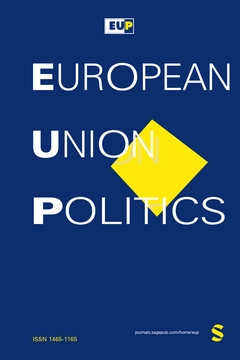 Measuring Interest Group Influence Using Quantitative Text AnalysisHeike KlüverEuropean Union Politics, Dec 2009
Measuring Interest Group Influence Using Quantitative Text AnalysisHeike KlüverEuropean Union Politics, Dec 2009The analysis of interest group influence is crucial in order to explain policy outcomes and to assess the democratic legitimacy of the European Union. However, owing to methodological difficulties in operationalizing influence, only few have studied it. This article therefore proposes a new approach to the measurement of influence, drawing on quantitative text analysis. By comparing interest groups’ policy positions with the final policy output, one can draw conclusions about the winners and losers of the decision-making process. In order to examine the applicability of text analysis, a case study is presented comparing hand-coding, WORDSCORES and Wordfish. The results correlate highly and text analysis proves to be a powerful tool to measure interest groups’ policy positions, paving the way for the large-scale analysis of interest group influence.
@article{kluver_measuring_2009, title = {Measuring {Interest} {Group} {Influence} {Using} {Quantitative} {Text} {Analysis}}, author = {Klüver, Heike}, year = {2009}, month = dec, journal = {European Union Politics}, volume = {10}, number = {4}, pages = {535--549}, doi = {10.1177/1465116509346782}, issn = {1465-1165, 1741-2757}, url = {https://journals.sagepub.com/doi/10.1177/1465116509346782}, urldate = {2025-05-15}, copyright = {https://journals.sagepub.com/page/policies/text-and-data-mining-license}, language = {en}, data = {https://journals.sagepub.com/doi/10.1177/1465116509346782}, }